Festive Fronds Holiday plants start in the summer



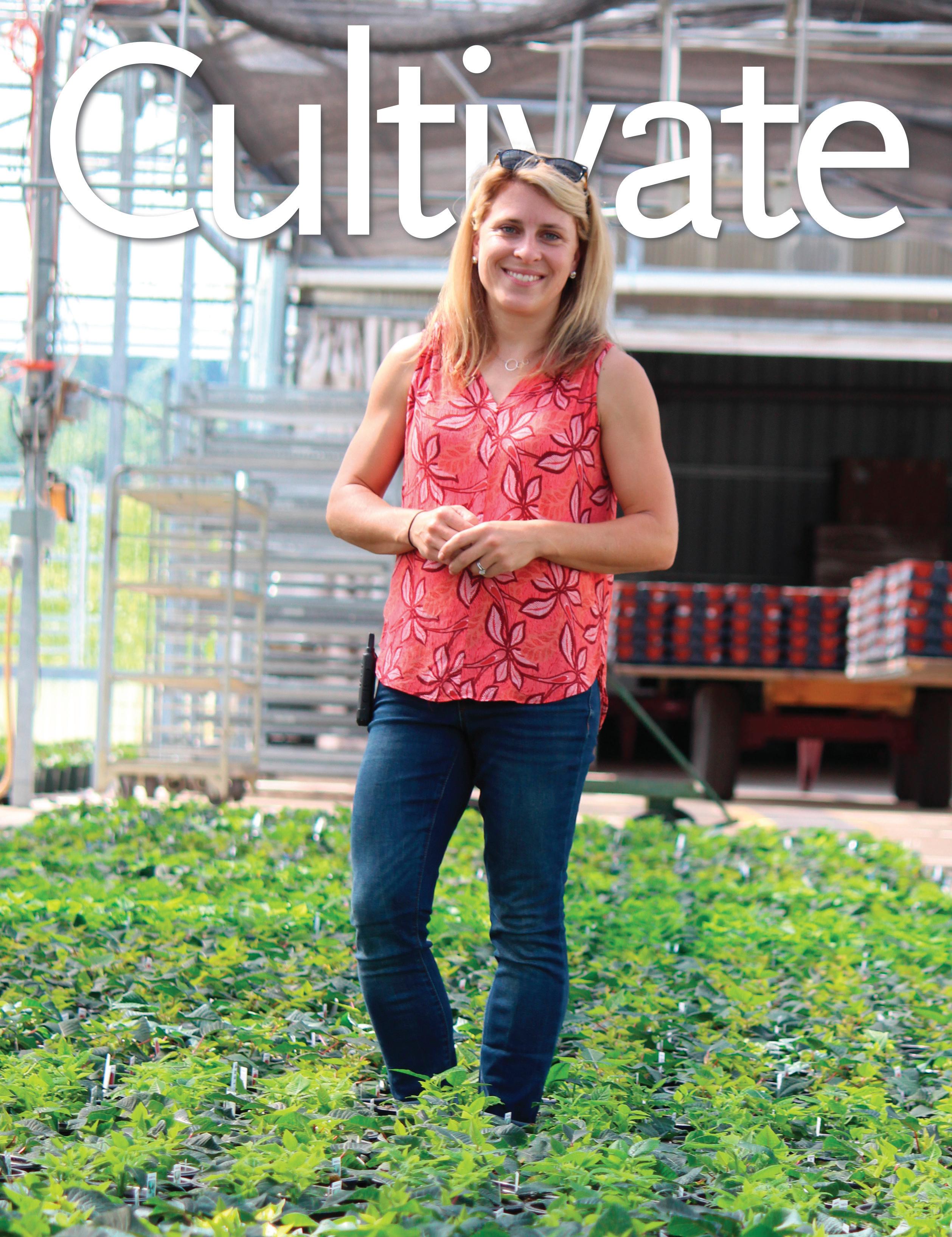
Edible landscaping allows homeowners to literally eat the fruits of their gardening labor.
Pretty and practical, the ancient art of pottery is given new twists by Virginia artisans.
Virginia State University conducts a surprising amount of research with a broad influence on Virginia agriculture.
Blossoming bulbs and bright-colored poinsettias liven up indoor areas for the holidays and beyond.
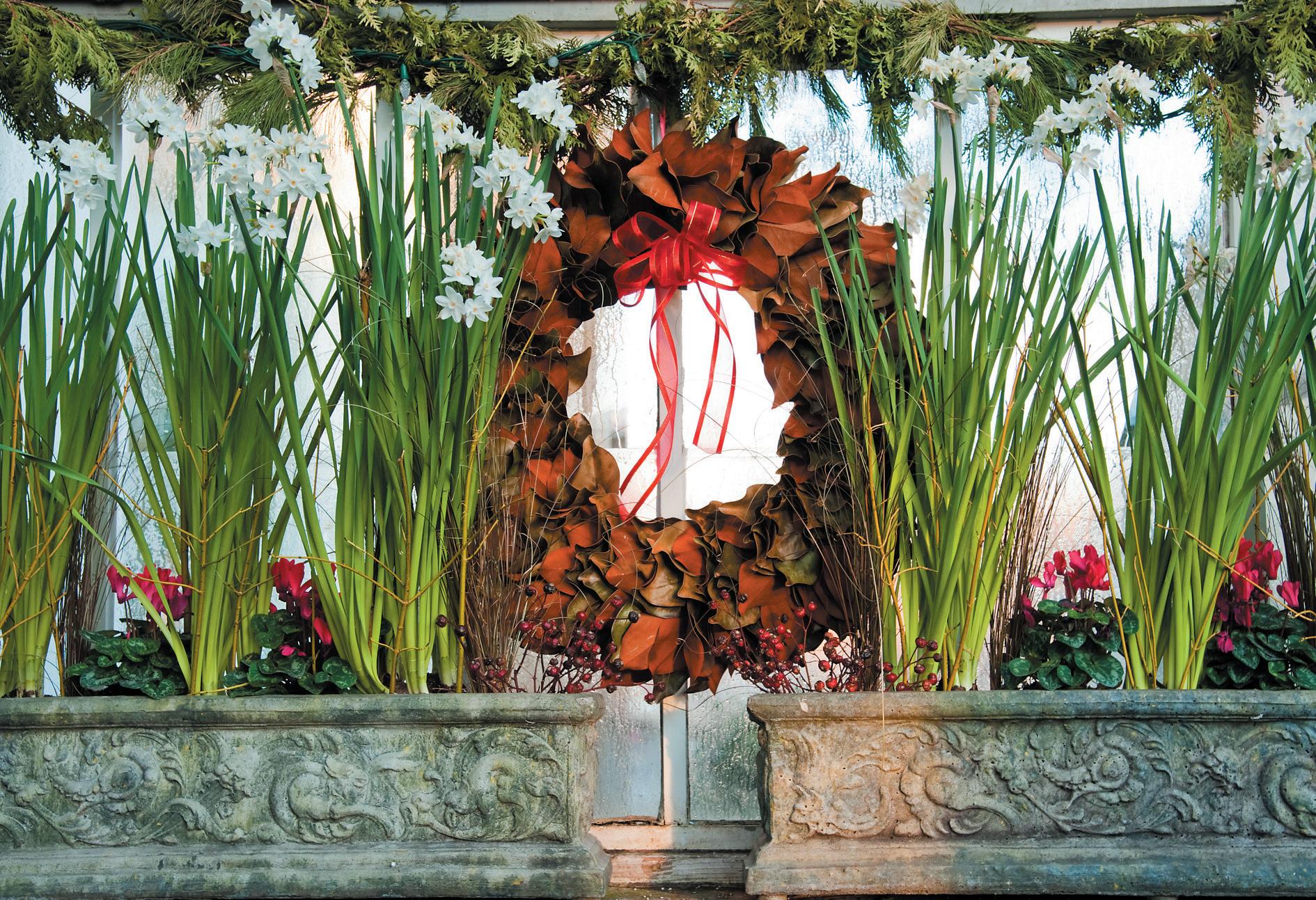
Volume 16, Number 4 Fall 2022
Cultivate (USPS 025051) (ISSN 19468121) is published four times a year. February, May, August, October. It is published by Virginia Farm Bureau Federation, 12580 West Creek Parkway, Richmond, VA 23238. Periodicals postage rate is paid at Richmond, VA and additional mailing offices. The annual Subscription Rate is $1.13 (included in membership dues).
18Postmaster: Please send changes of address to, Cultivate, Virginia Farm Bureau Federation, P.O. Box 27552, Richmond, VA 23261; fax 804-2901096. Editorial and business offices are located at 12580 West Creek Parkway, Richmond, VA 23238. Telephone 804-290-1000, fax 804-290-1096. Email address is Cultivate@vafb.com. Office hours are 8 a.m. to 4:30 p.m., Monday through Friday. All advertising is accepted subject to the publisher’s approval. Advertisers must assume liability for the content of their advertising. The publisher assumes no liability for products or services advertised. The publisher maintains the right to cancel advertising for non-payment or reader complaints about services or products.
Member: Virginia Press Association
Pam Wiley Vice President, Communications Kathy Dixon Managing Editor
Nicole Zema Staff Writer/Photographer
Adam Culler Staff Writer/Photographer
Maria La Lima Graphic Designer
Alice Kemp Staff Writer/Advertising Coordinator
MEMBERS — Address change? If your address or phone number has changed, or is about to change, contact your county Farm Bureau. They will update your membership and subscription information.
Associate members will receive their next issue of Cultivate in February. The magazine is published quarterly, and back issues can be viewed at issuu.com/virginiafarmbureau.
Maggie Crosby Edwards stands among young poinsettia plants
“Having something beautiful and alive
… takes care of the winter doldrums.”
— BECKY HEATH, Brent and Becky's Bulbs, Gloucester County
There are endless benefits to buying a fresh-cut Christmas tree.
Every holiday season, thousands of Virginians invoke a family tradition of visiting the state’s nearly 500 Christmas tree farms to find a tree for their holiday celebrations.
Whether you select a pre-cut tree or cut one yourself, there are benefits beyond family memories, according to the Virginia Department of Forestry.

The average Christmas tree takes five to 10 years to
reach the ideal size for cutting. While they grow, the trees provide wildlife habitat. They also produce oxygen while absorbing and storing carbon. Christmas trees can be grown on poor soils where few other crops would grow, and they reduce erosion, helping improve water quality.
After trees are cut, they typically are replaced with another planting. And cut Christmas trees are 100% recyclable and biodegradable. When trees are left for curbside removal, they often are turned into mulch for gardens, hiking trails and playgrounds.
That’s how many poinsettias are grown annually by Cros-B-Crest Farm, a family-run wholesale operation in Staunton. The family’s plants have been beautifying homes, businesses and churches since 1986.
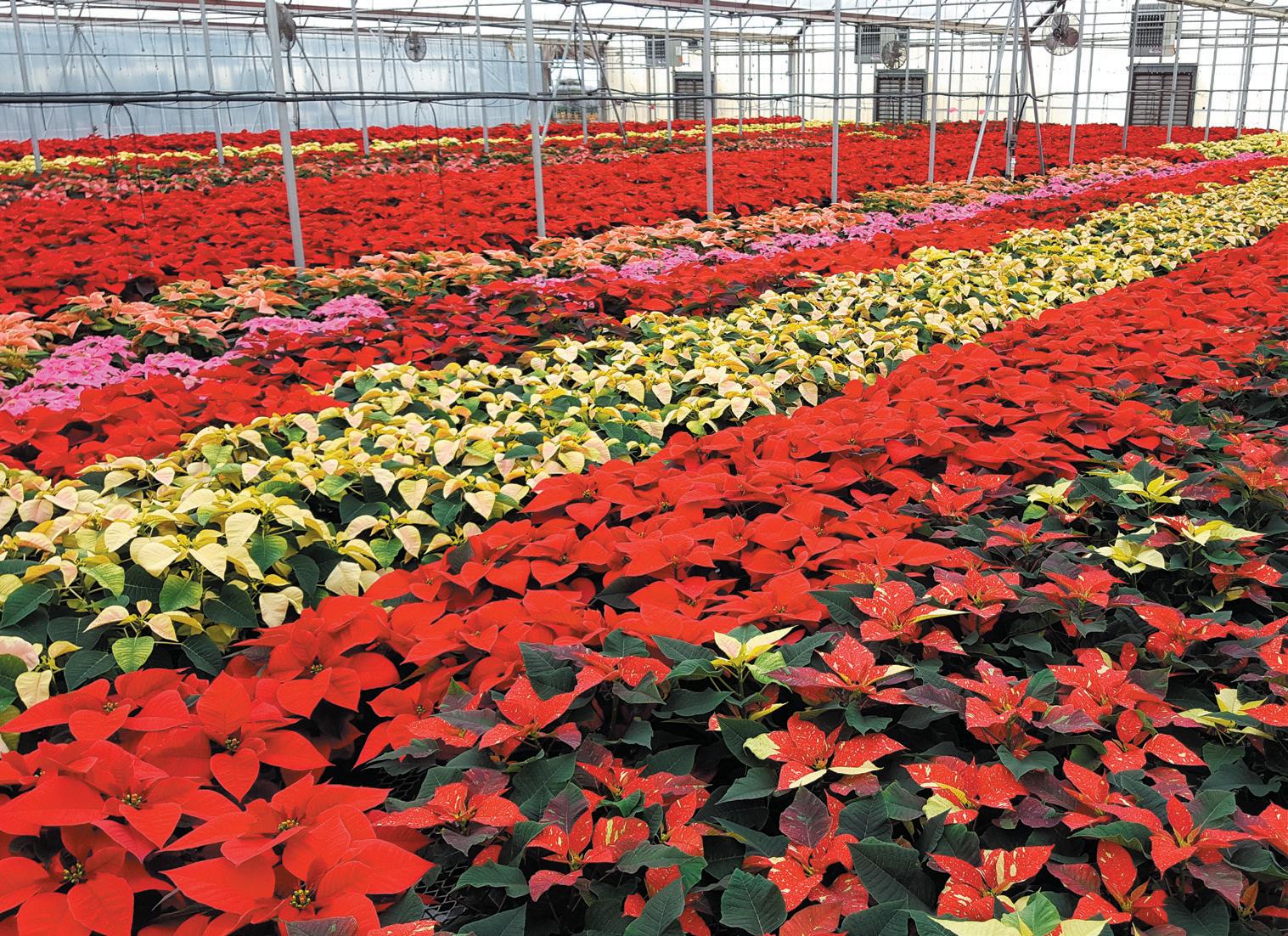
Featured this month on Real Virginia, Virginia Farm Bureau’s weekly television program:
• The Port of Richmond and the Port of Virginia in Norfolk play an important role in global trade.
• Cheers to the state’s wine industry.
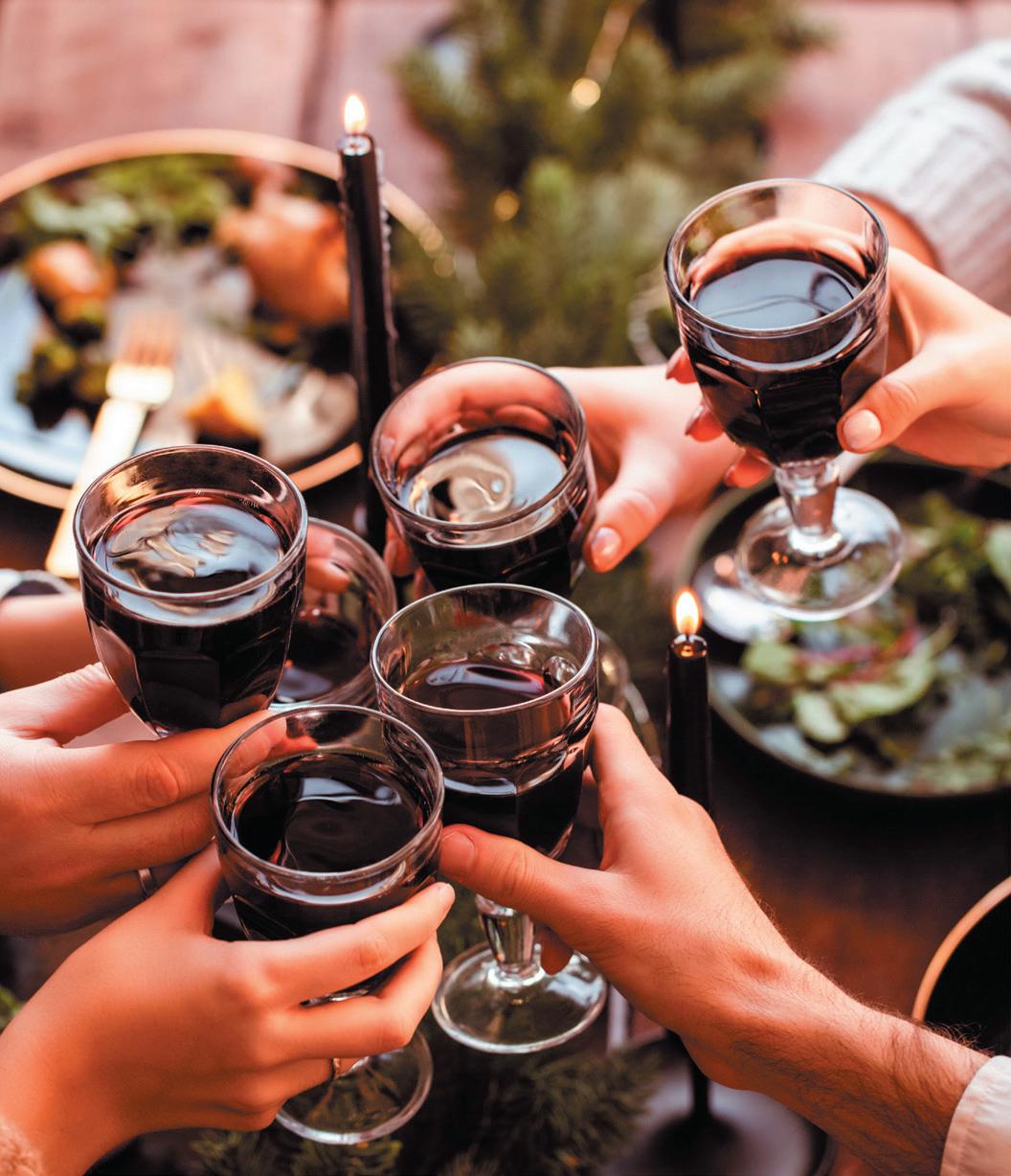
• Caroline County agriculture is featured on this month’s County Close-up.
Real Virginia airs nationwide at 3:30 p.m. on the first Saturday of each month on RFD-TV on Dish Network and DirecTV, and on selected cable outlets around the state. It airs weekly on WBRA digital channel 15.2, WHRO Norfolk, WVVA Bluefield and WTKR Norfolk, and on the first and third weekends of each month on WVIR Charlottesville, WHSV Harrisonburg and WRLH Richmond.
Virginia Farm Bureau members can get paid for leasing land to Vogue Towers for installing a wireless communication tower.
VFB has partnered with Vogue Towers to implement a marketing program to further wireless connectivity throughout Virginia while compensating Farm Bureau members. Vogue’s management team has built more than 5,000 towers in the U.S. since 1996. Cell towers allow wireless networks to better serve the communities in which they’re located, improving cell phone reception and ensuring the highest level of safety.
Members who are interested in leasing land for a tower should register their information with Vogue Towers through our website, vafb.com/membership-at-work/ membership/benefits/VogueTowers. Registration is not a commitment to lease your property, but simply an expression of interest in the program. After you submit an opt-in form on that page, Vogue Towers will contact you directly when they are seeking space for towers in your area.
If a tower is built on a member’s property, that member will be paid a one-time fee and then receive a monthly rent with annual escalation. The initial lease is for a 5-year term with seven 5-year renewals.
The leased area will be 55´ x 55´ up to 75´ x 75´, and the height will be determined by the phone carrier. All towers will have a secure, fenced compound. Vogue maintains insurance on the tower and takes care of all ground maintenance.
Prescription drug prices have skyrocketed over the last few years, but Farm Bureau members in Virginia are now eligible to receive free generic prescriptions delivered right to their door!
My Free Pharmacy is offering VFB members a special subscription rate of $17.96 a month for individuals or $26.96 monthly for families.
Members then receive free 21-day supplies of 125 generic acute medications at any pharmacy nationwide and 90-day supplies of chronic care generic medications, with free shipping to your door. They also are eligible to purchase over-the-counter medications at a fraction of the price on chronic care generic medications.
Westmoreland County Farm Bureau member Summer Downs signed up for the program and said even with the monthly subscription fee, her family will save almost $200 a month. “They have 85% of the medications we need, and the website is easy to use.”
Access the pharmacy helpline at 800-257-8420, or visit myfreepharmacy.com/virginia
Dollywood’s Harvest Festival Presented by Humana was voted America’s No. 1 Fall Family Event by USA Today readers.
Farm Bureau members in Virginia receive $10 off regular and children’s gate admission at Dollywood Theme Park in Pigeon Forge, Tennessee. Admission includes the Harvest Festival, which is open through Oct. 30.
During the event, theme park guests can view fall decorations as they listen to the sounds of bluegrass and Southern gospel music on open-air stages.
Also available are traditional Smoky Mountain culinary favorites, including smoked brisket, pork belly, turkey legs, fried green tomatoes, corn pudding and sweet potato casserole.
Unique craftsmen from around the country will join Dollywood artisans in demonstrating and selling their handmade goods throughout the festival.
At night, Great Pumpkin LumiNights offers a festival within a festival. In parts of the park, guests can enjoy artistic sculptures, whimsical scenes and pumpkin-themed food options.
For more information, visit vafb.com/benefits or Dollywood.com.
Biltmore Estate in Asheville, North Carolina, was built by George and Edith Vanderbilt and is America’s largest home. The 8,000-acre property on which the home is located offers visitors tours, carriage rides, beautiful gardens, kayaking, horseback riding, paddle boarding, biking and more.
Farm Bureau members in Virginia will receive $10 off regular gate admission to the historic Biltmore estate. Members also can realize reduced rates at The Inn on Biltmore Estate, The Village Hotel and a variety of local accommodations.
While there, browse through unique estate shops for wine lovers, gardeners, bookworms and everyone in between. Savor complimentary tastings of more than 20 handcrafted wines; view rare treasures from the Biltmore collection; and learn about the estate’s barnyard animals. Visit Biltmore. com/corporateperk for more information. Tickets must be purchased in advance.
Your Farm Bureau membership gives you access to two programs offering significant savings at thousands of hotel properties. Reservations are required, and blackout dates may apply.
The Choice Hotels International program offers a 20% discount off “best available rates” for Farm Bureau members at more than 5,000 locations. To access this discount rate, call 800-258-2847 or visit choicehotels.com. Use the Virginia Farm Bureau identification number, available at vafb.com/ benefits and from your county Farm Bureau, when making a reservation. Present your membership card when you check in.
Whether you’re looking for an upscale hotel, an all-inclusive resort or something in between, Wyndham Hotels & Resorts has the right hotel for you! As a Virginia Farm Bureau member, you will save up to 20% off the “best available rate” at over 8,000 participating hotels worldwide.
To take advantage of this discount rate, call 877-670-7088 or visit wyndhamhotels.com/farm-bureau. Use the Virginia Farm Bureau identification number, available at vafb.com/ benefits and from your county Farm Bureau, when making a reservation. Present your membership card when you check in.
Fall is an opportune time to evaluate your health insurance coverage needs, and multiple open enrollment periods begin in October and November.
The Medicare Annual Election Period runs Oct. 15 through Dec. 7 and is when Medicare beneficiaries can purchase or change their Medicare Advantage plans or Part D prescription coverage for the upcoming year.
During this time, subscribers can enroll in, withdraw from or switch Medicare Advantage plans, also known as Medicare Part C, as well as their Part D prescription coverage. Policy changes made during the Annual Election Period go into effect Jan. 1, 2023.
“This enrollment period is a good time to review your current coverage to see if you’re on a plan that best fits your needs for the upcoming year,” said Tracy Cornatzer, sales manager
for VFB Health Insurance division.
“Your prescriptions and medications can change throughout any given year, so it’s important to take a look at the bigger picture of what certain plans will provide.”
Cornatzer noted that beneficiaries should consider their prescription costs and provider network. Out-ofpocket expenses for medical services also vary by plan.
Individuals who turn 65 years old outside of the Medicare Annual Election Period still can obtain coverage for 2023. New beneficiaries can enroll during their Initial Medicare Enrollment Period, which starts three months before the person’s 65th birthday, and concludes three months after.
From Nov. 1 until Jan. 15, individuals and families under 65 years old can enroll in or change their health, dental and vision plans during the Affordable
Care Act open enrollment period.
ACA plans do not require medical underwriting, and those who subscribe during this open enrollment period will have coverage for the coming year. The effective date is determined by the date applications are submitted, but coverage generally goes into effect Jan. 1, 2023, for those who enroll before the new year begins.
Typically, these plans are purchased by individuals and families when employer group coverage is not available. If you miss this open enrollment period, you may have to wait until the following year’s open enrollment to sign up for a plan unless you have a special qualifying event to obtain coverage.
As with the Medicare Annual Election Period, the ACA open enrollment period is another useful window to determine whether your current insurance plans are meeting your needs.
>> cont'd on p. 26
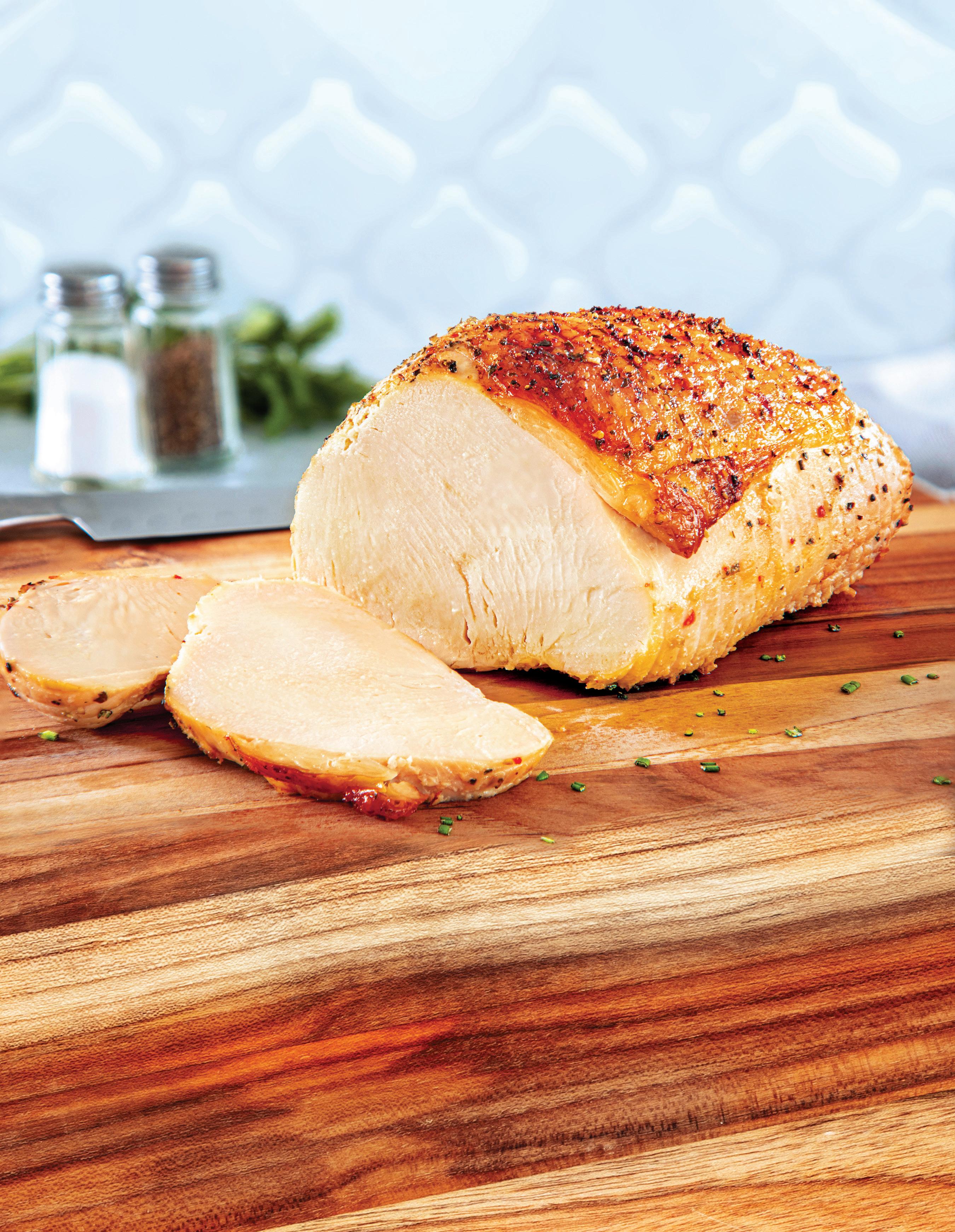
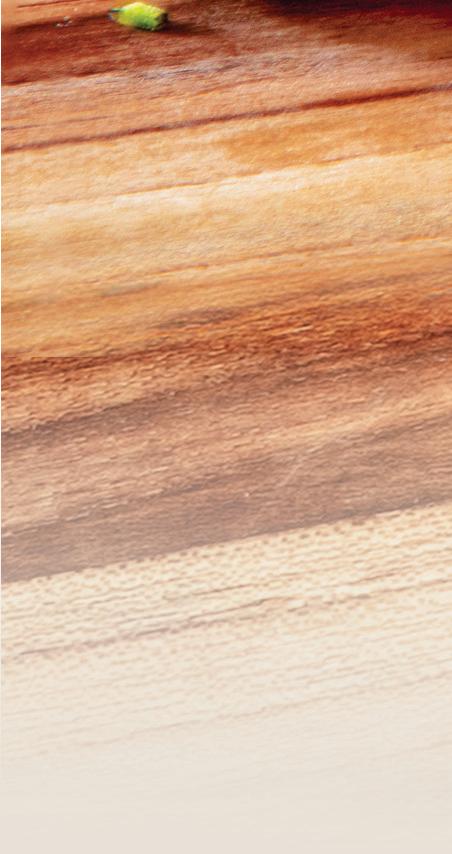
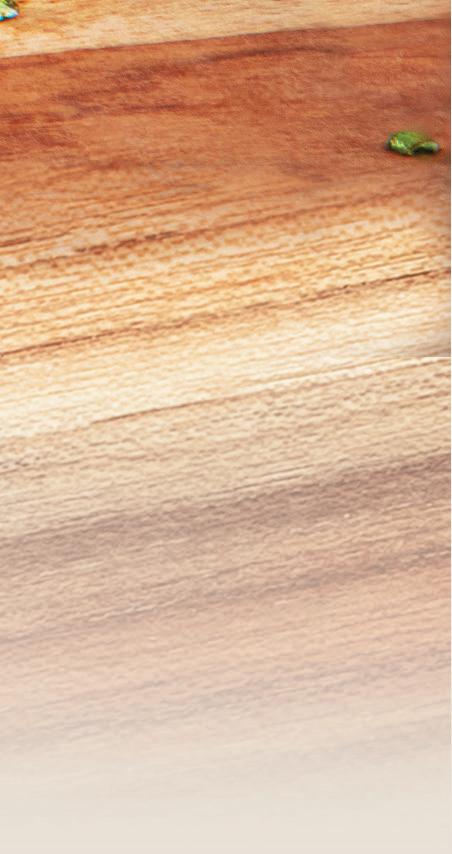










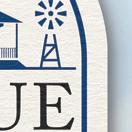

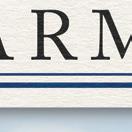







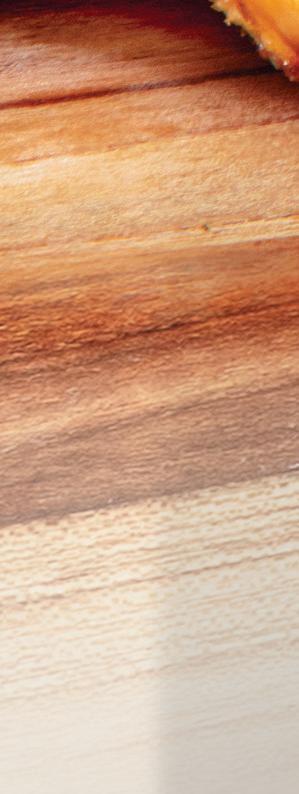





































































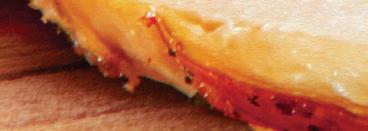








































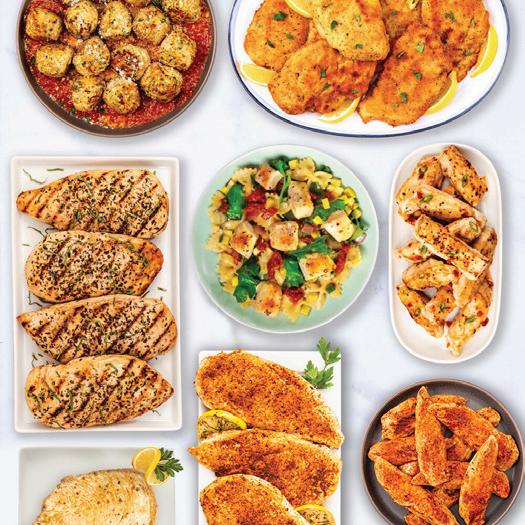




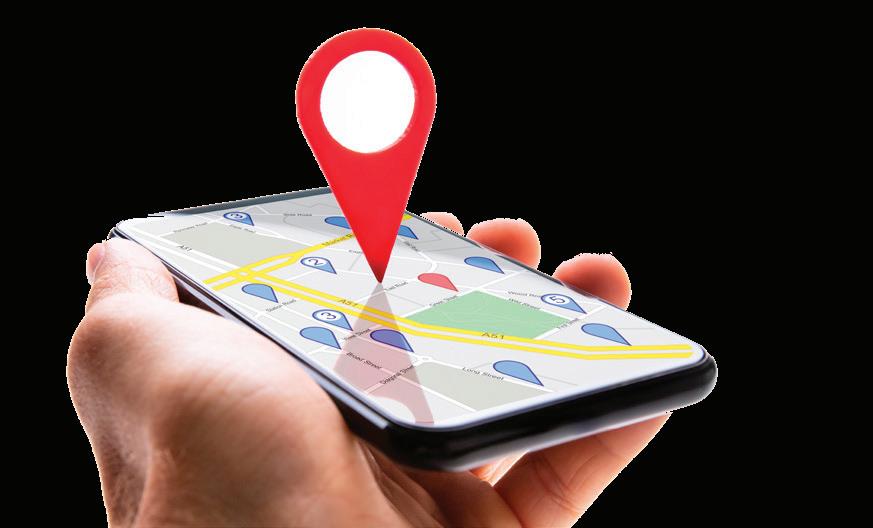
Dora Gurganus of Gurganus Peanut Outlet in Southampton County was misquoted in an article on the Salty Southern Route in the summer issue of Cultivate. The correct quote is as follows:
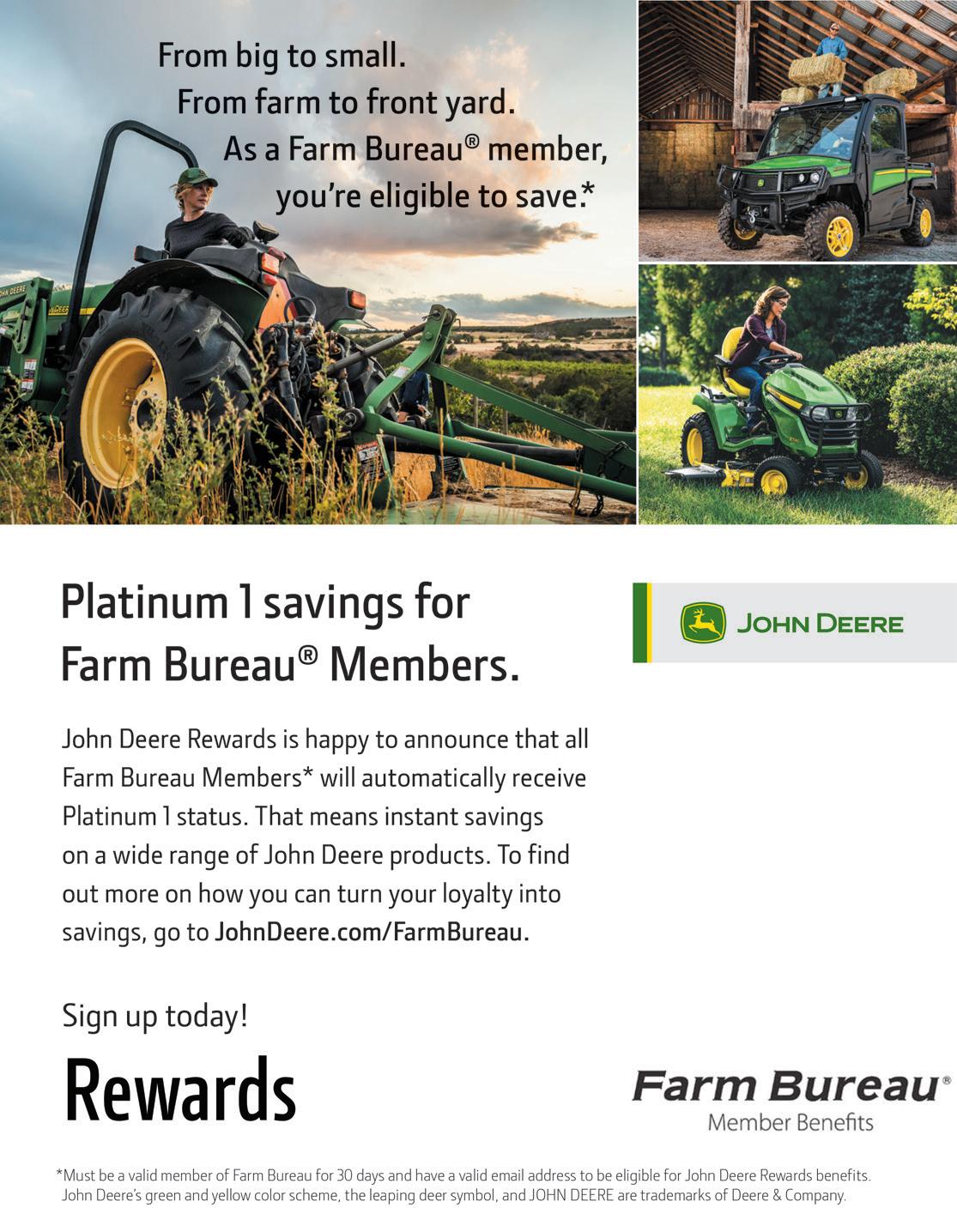
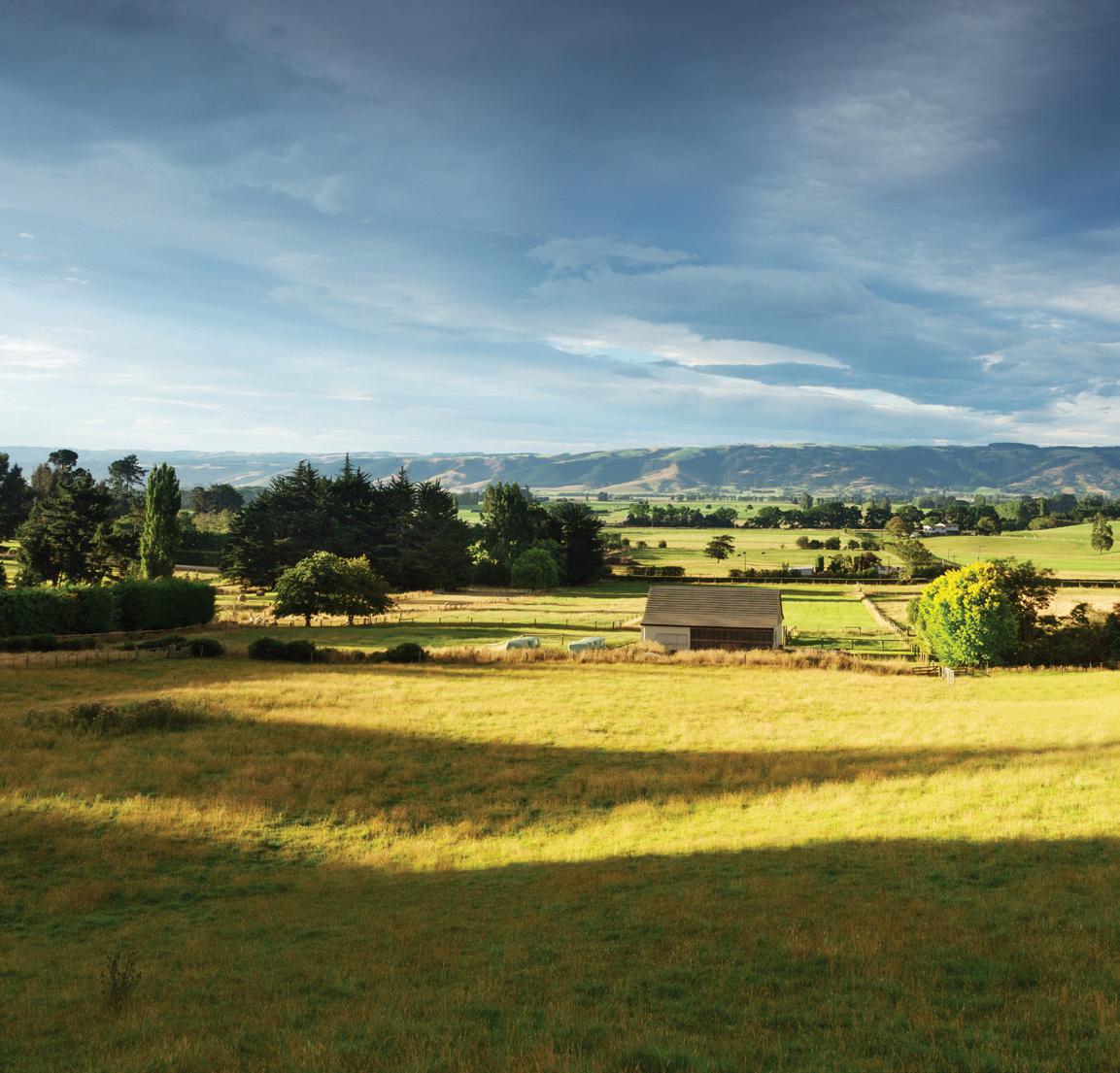

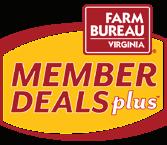
“What makes our peanuts special is the larger gourmet quality, cooked in peanut oil. To make them blistered, raw peanuts are blanched in water, drained and then dropped into the peanut oil, causing blisters.”

McConkey’s gardento-table supply chain spans 25 acres of orchard and greenhouses in Nelson County. His small nursery, called Edible Landscaping, sells over 180 exotic and native cultivars that are sold and shipped locally, throughout Virginia and nationwide.
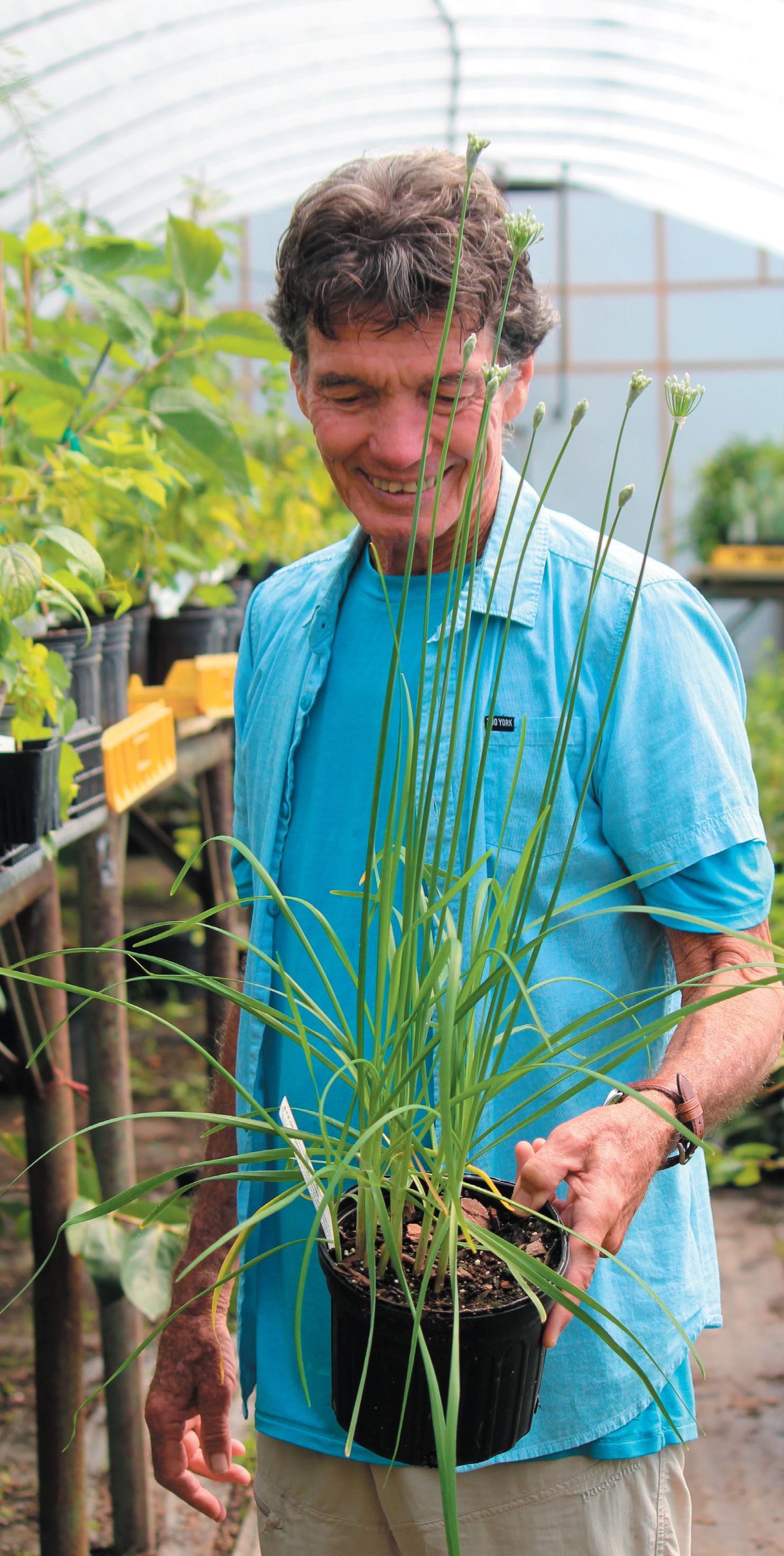
A promoter of backyard orcharding since 1979, McConkey wants potential growers to know that cultivating their own “foodscape” of edible fruits, herbs, berries, nuts and flowers is within reach.
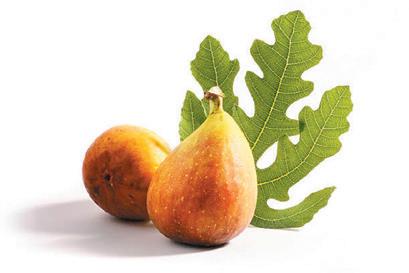
The Edible Landscaping staff prioritizes education when selling plants, helping homeowners choose what cultivars may perform best.
A customer approached, asking about indoor edibles.
“Maybe coffee or lemongrass,” McConkey replied, leading her to a greenhouse.
Since he lives on site, most of his own meals are picked fresh from the backyard pantry.
McConkey started his day with a purple mixture of milk and elderberry syrup, and a to-go mug of green tea lemonade for a caffeinated kick. For breakfast he packed a jar with Magness pear, fig, milk, nuts and blueberries. Dinner’s entree was prepared with garden-grown basil pesto.
“We do go shopping, but I don’t get
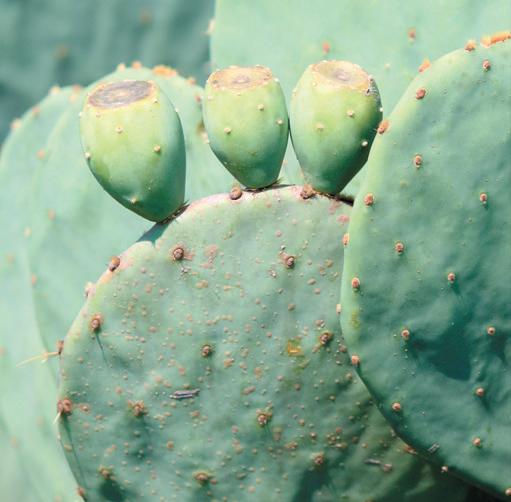
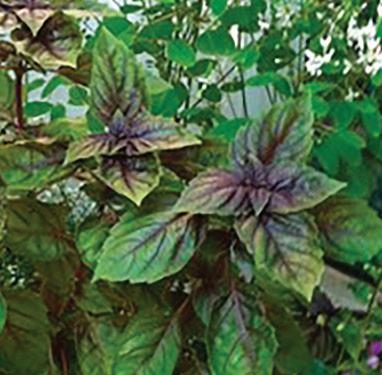
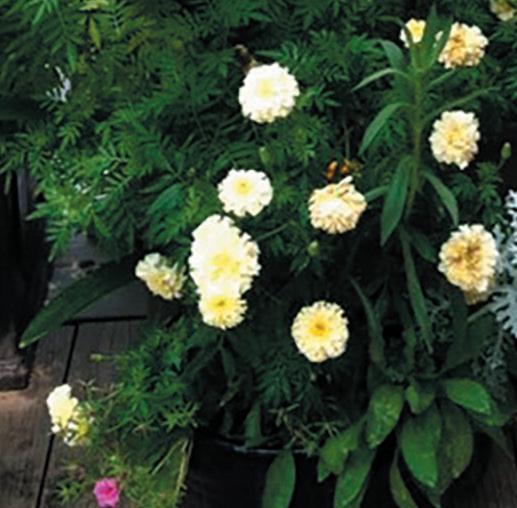
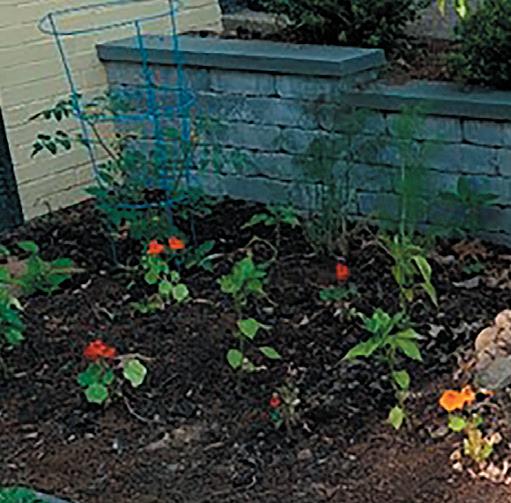
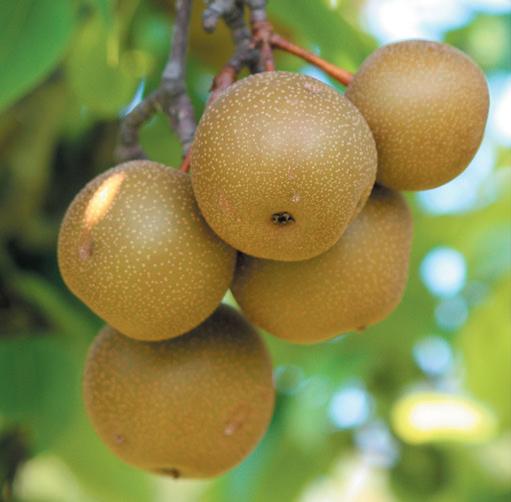
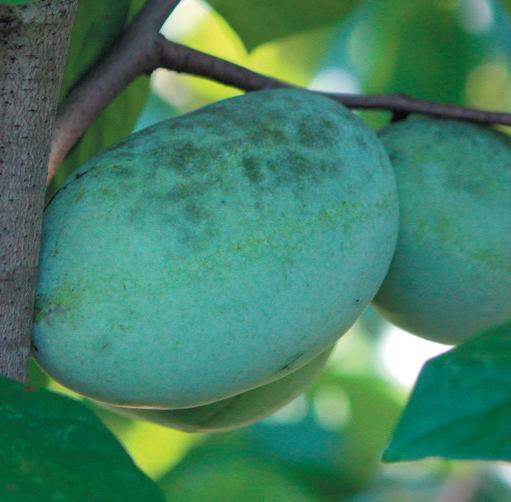
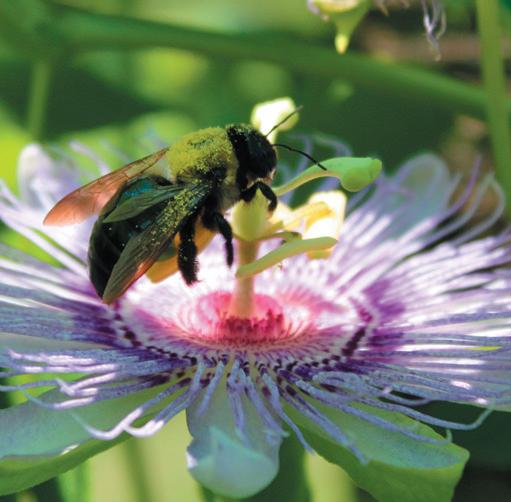
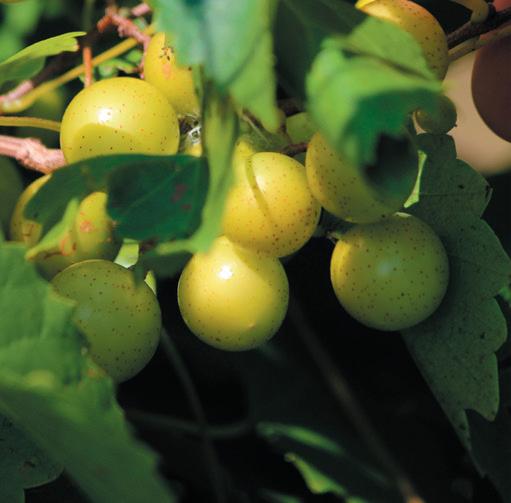
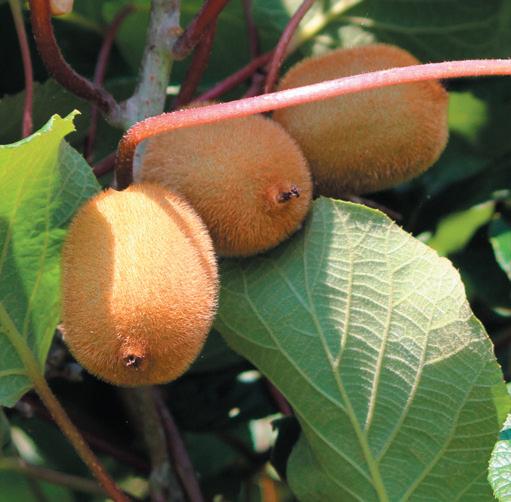
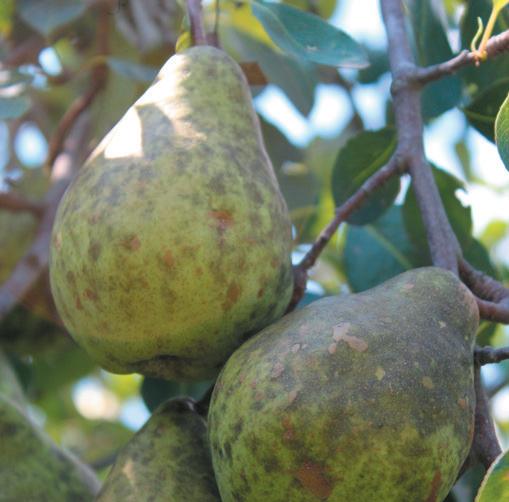

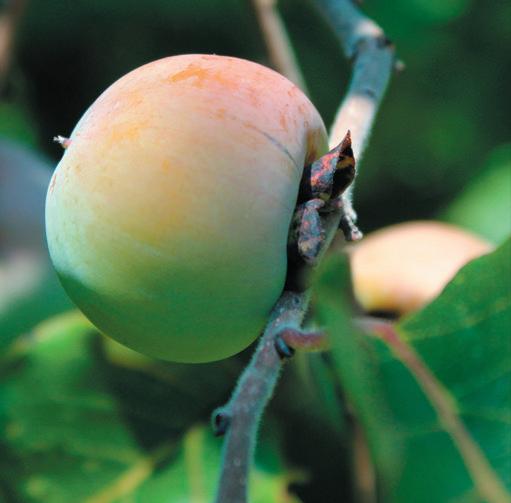

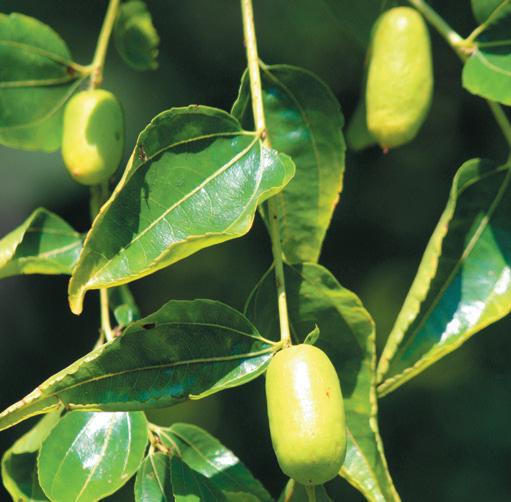
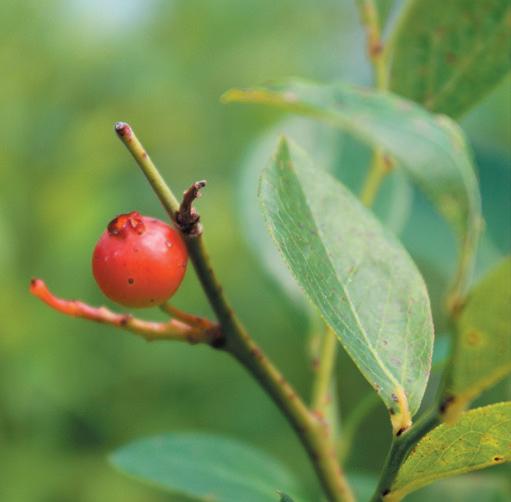
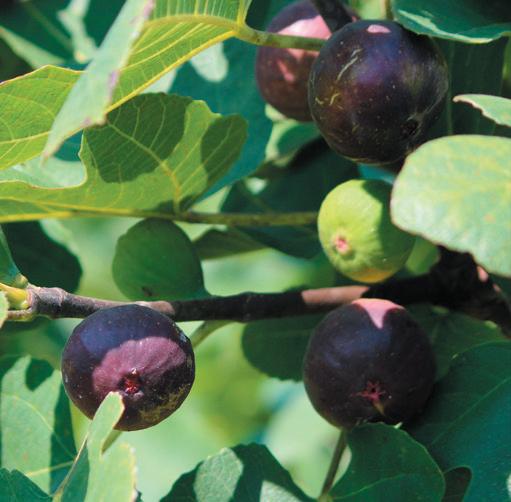
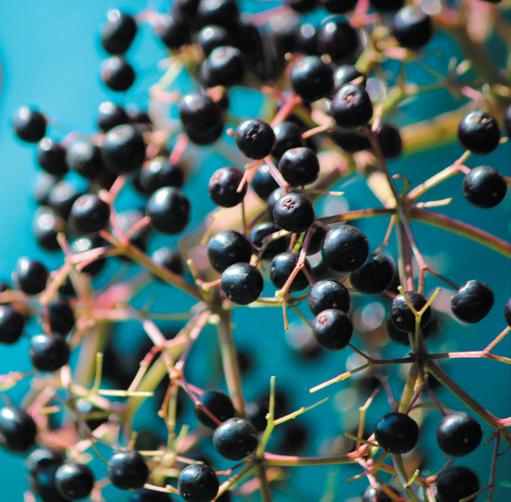
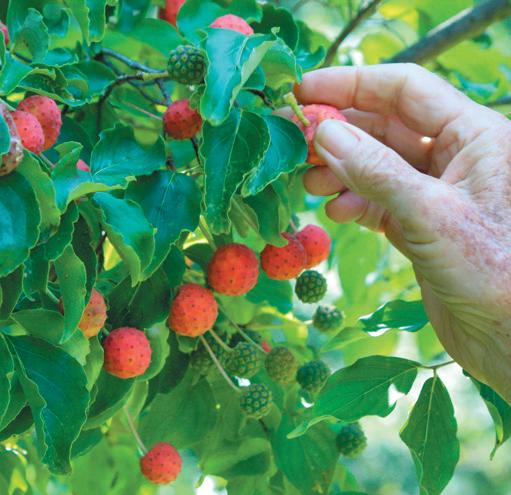
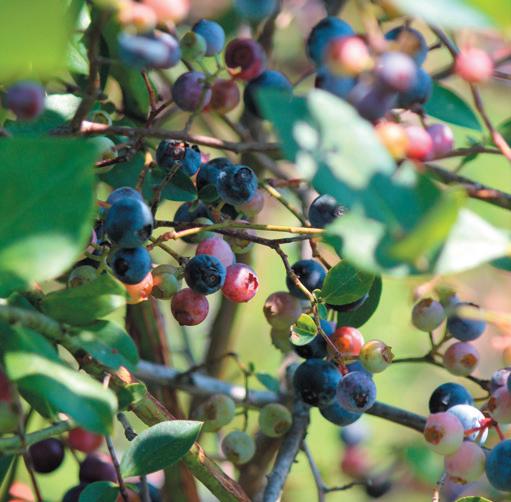

excited about seeing mangoes in the store,” he said.
Pawpaw trees, goumi shrubs, kiwi vines and chinquapin nut bushes are managed by hand with no chemical input. McConkey has attempted to grow hundreds of varieties over the years, and about one-third have passed the test.
“A lot of this is a test orchard,” he said. “We’ve found what actually works here.”
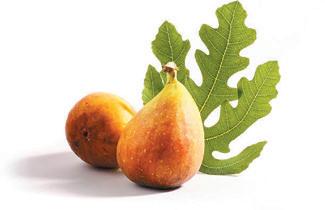
With trial and error, the nursery developed an extensive edible inventory, including desert-loving species like the prickly pear hardy cactus.
“I juice them for fruit salads,” he said. “It’s a little vegetably-tasting, like beet juice with an aloe consistency, and deep red. It’s good on sweet fruit or citrus salads.”
While the edible foods are grown in Virginia, they are shipped across the country. Janet Dickie, office manager for almost 30 years, flipped through a stack of orders from Colorado, Illinois, Iowa and Utah. They ship year-round in uniquely designed shipping boxes that prevent plant damage.
Post-pandemic business was strong, she said, as more people worked from home and interest in permaculture has grown.
“It went from being a fad to a way of life.”
Virginia Cooperative Extension Master Gardener Alyssa Ford Morel tried her first Padrón pepper while vacationing in Spain. It was a revelation.
“When we came back to America, I wanted to grow those, because I couldn’t find them in the grocery store or farmers market,” she recalled.
Now, in addition to the Spanish peppers, Morel’s edible landscape includes natives like fennel, Jerusalem artichoke and an edible passionflower vine that doubles as a privacy screen.
“And our Swiss chard is going gangbusters!” she said.
Morel considers the design aesthetic, thoughtfully employing elements of color, texture, line, placement and form, by interplanting, trellising and layering edible species.
Growing an edible landscape can be done affordably.
“I encourage you to start small,” she advised beginners. “Pick a few plants to try. Don’t try to convert your entire yard.”
For Virginians without a garden plot, Morel suggested edibles suitable for containers, like arugula, cherry tomatoes, hot peppers, kale, leeks and sweet potatoes.
Visit bit.ly/3S8w8A9 to see an edible landscaping video, presented by Master Gardeners of Northern Virginia. To see edible varieties in the Edible Landscaping catalog, visit the website at ediblelandscaping.com.
Since Virginia has a broad range of geographical regions, soil types, temperature ranges, humidity levels and precipitation, selections should be appropriate for specific localities. Check what will thrive in your zone by cross-referencing a U.S. Department of Agriculture Plant Hardiness Zone Map.
For a low-maintenance foodscape, select species or cultivars resistant to insects and diseases.
To combat inundation by hungry birds, cover plants with a fine mesh crop net about two weeks before fruits ripen.
A lack of pollinators in the area may result in poor yields. To attract more pollinators, plant native species like coneflowers and sunflowers nearby.
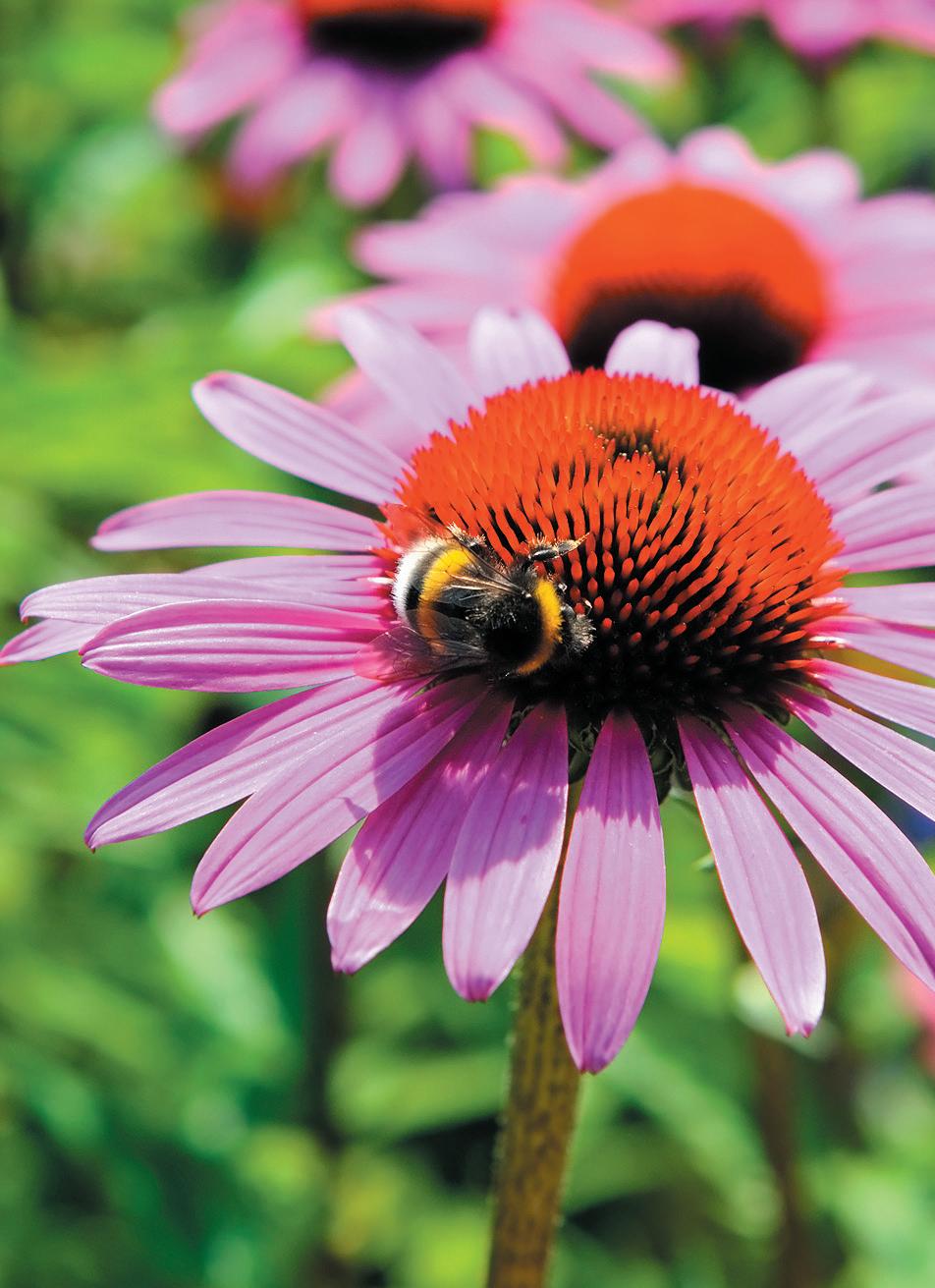
From sherds of ceramic interred in soil to modern designs displayed in gallery settings, human hands have been shaping clay into objects for millennia.
According to archeological records, Virginia’s earliest dated pottery is 3,090-yearold Bushnell Ware made by Native Americans. It was excavated near the Potomac River in
Westmoreland County from the Woodland period—a timeframe known for the adoption of agriculture and pottery. Though cultures, technology and manufacturing have shifted, the ancient utilitarian art form still connects us to the first Virginians.
Clay artist Kiki Rangel, pottery manager of Bailey Ceramic Studio at the Virginia Beach Art Center, shares this tradition with anyone willing to get their
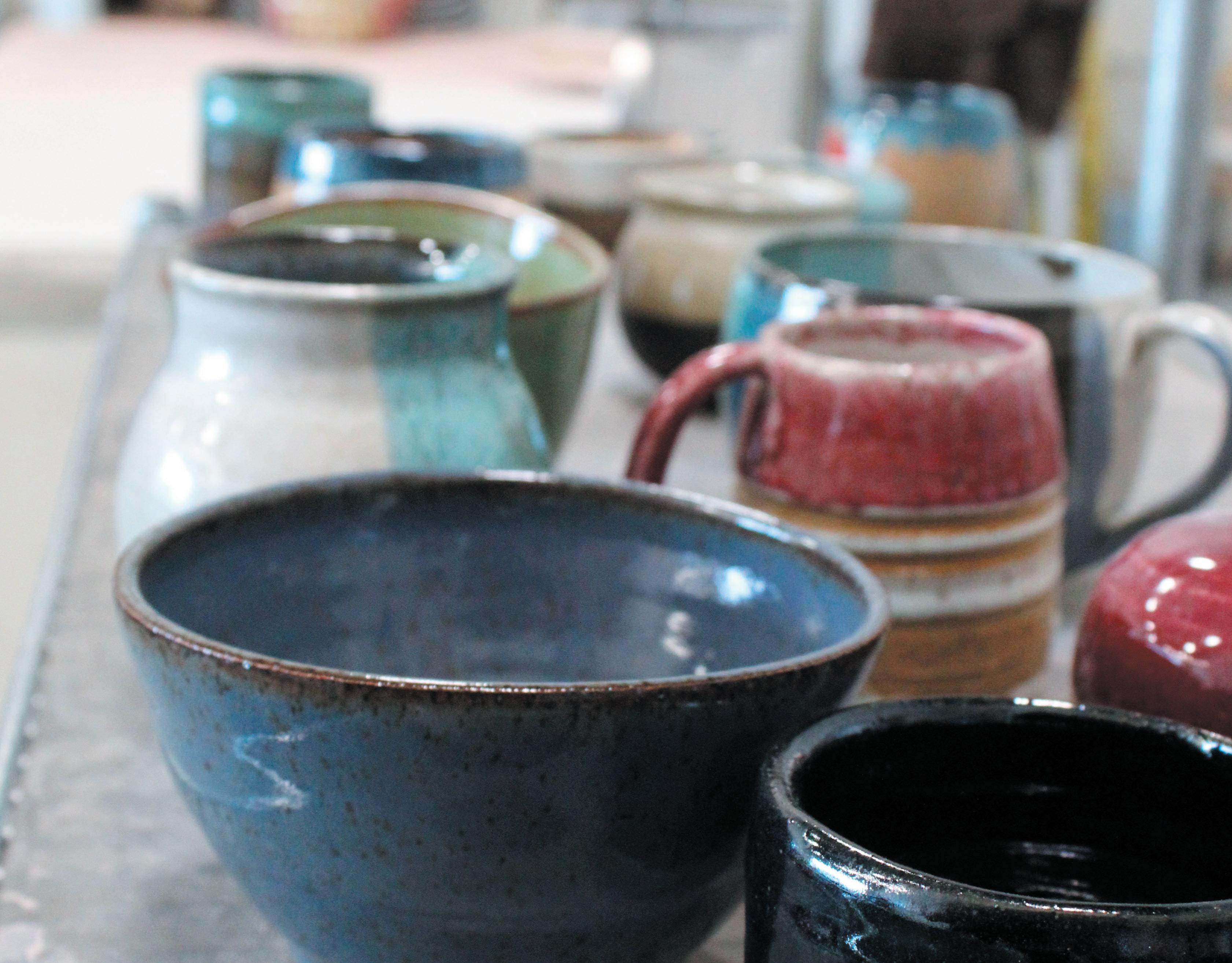
Virginia-made pottery is a long-utilized art form
hands wet.
“I can have the worst day ever, sit in front of the wheel, and it’s magic to take a lump of nasty, dirty clay, and create a beautiful bowl or vase,” she said. “The motion is very therapeutic. Your hands are going slowly. You forget about all the troubles in the world. You’re in the zone.”
The center opened in
2018 and is now located in the ViBe Creative District near the oceanfront. The ceramics studio offers about nine weekly classes on wheel throwing and hand building, with 12 pottery wheels, a glazing and kiln room, and plenty of workspace.
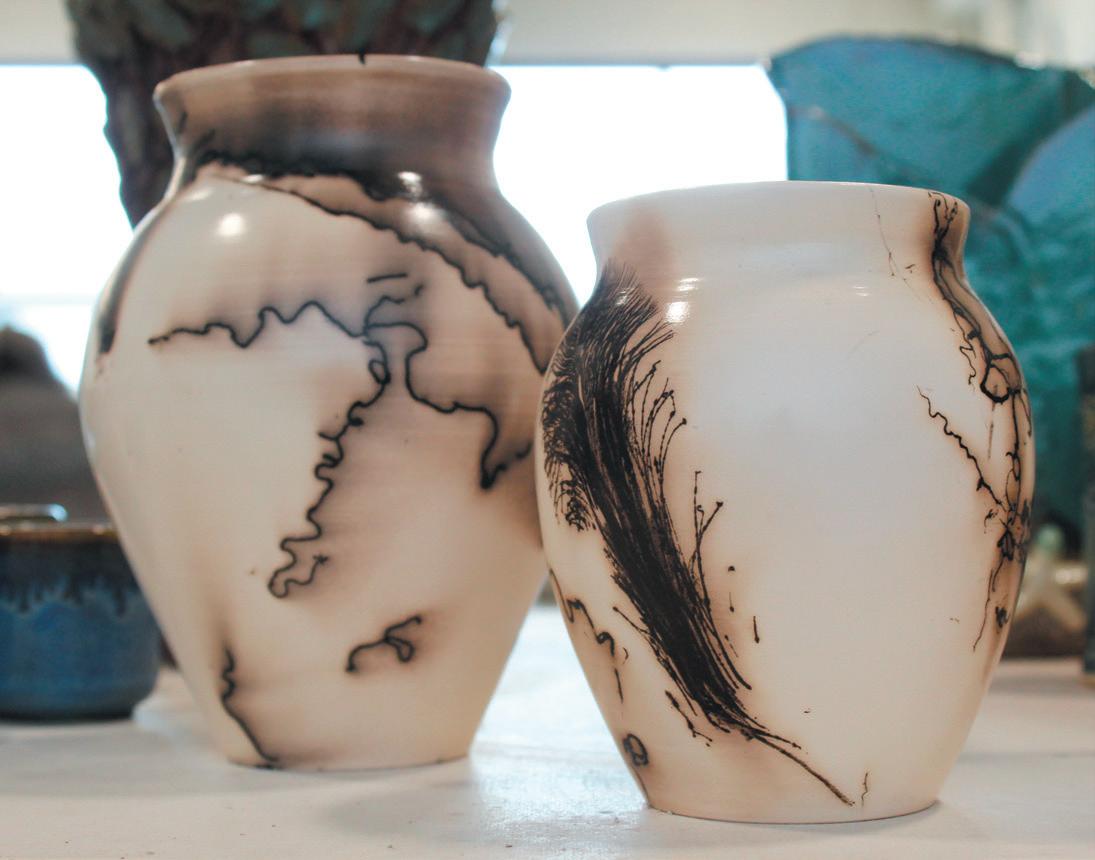
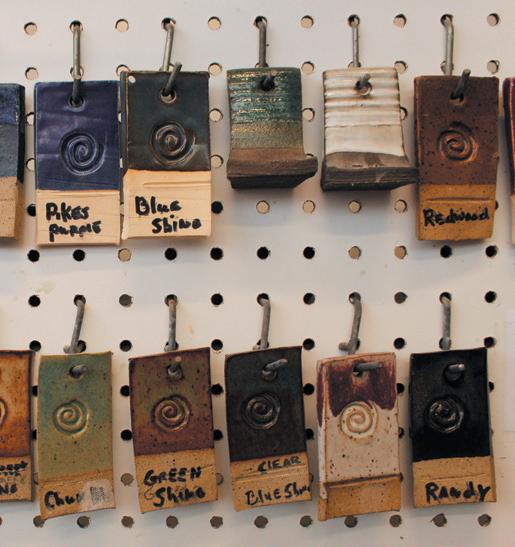
“Then we have open studio hours, which is a time to come in and play around, or work with what they started in their classes,” said Margaret
Foltz, the center’s executive director. “You get a block of clay, and that comes with two firings and glazings— both low fire and high fire. And we use reclaimed clay as much as possible.”
The Artist Gallery is brimming with handmade, original pieces that reflect the heritage of coastal Virginia, priced and grouped by co-op artists. Crabs, seashells, honeybees and cows are depicted on the gallery’s highly stylized
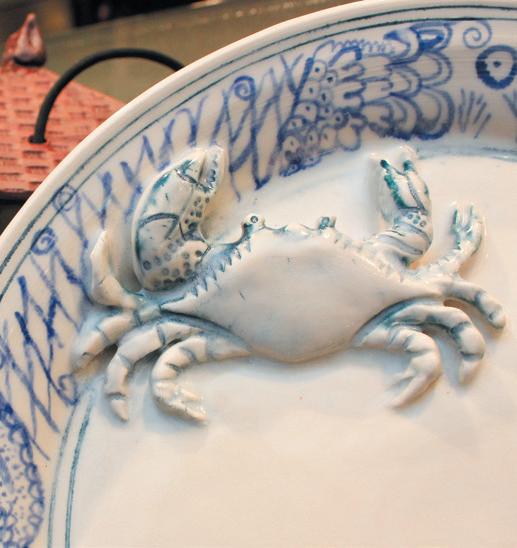
ceramic creations, among other mediums.
“It’s all part of a collaboration creating local art for local people,” Foltz continued.
In the studio, pottery novice Shameka Harris of Chesapeake held an edger to the bottom of a spinning bowl. The space is an opportunity for artistic development, plus personal reprieve.
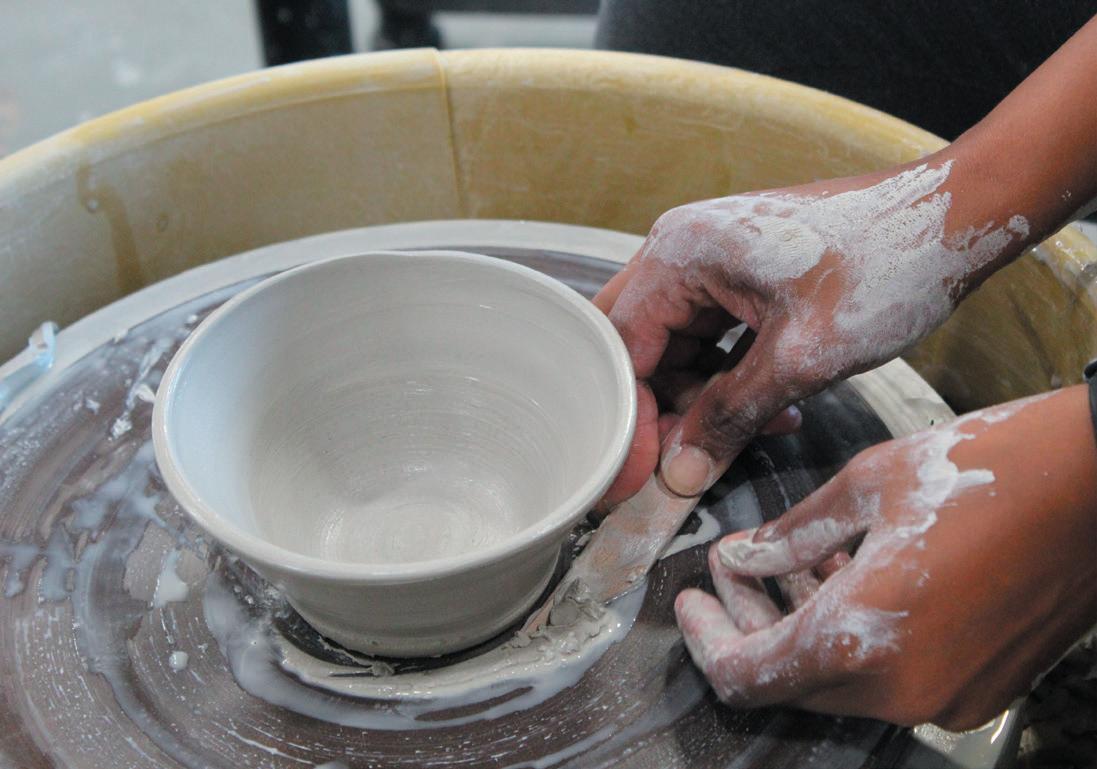
“It seemed so involved and serious before I tried

it,” she said. “But it’s a form of self-expression that’s also very calming. I have small children at home, so this is my getaway! The more I do this, the more I want to do it.” Harris’ children are impressed with the glazed pieces brought home.
“They say, ‘Mommy, you made this!’”
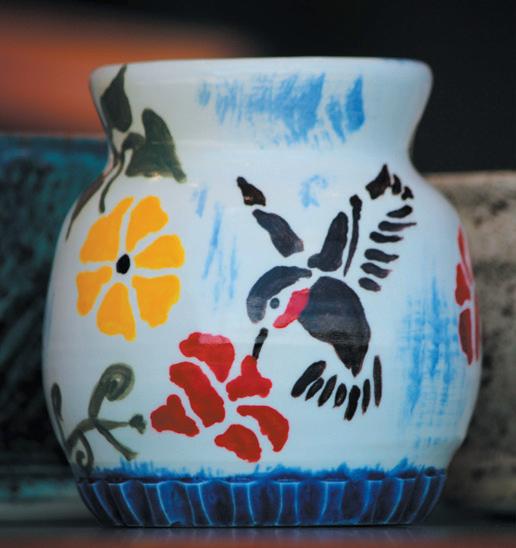
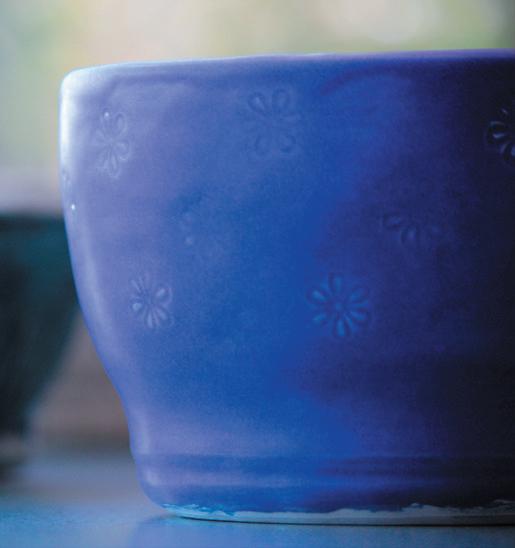
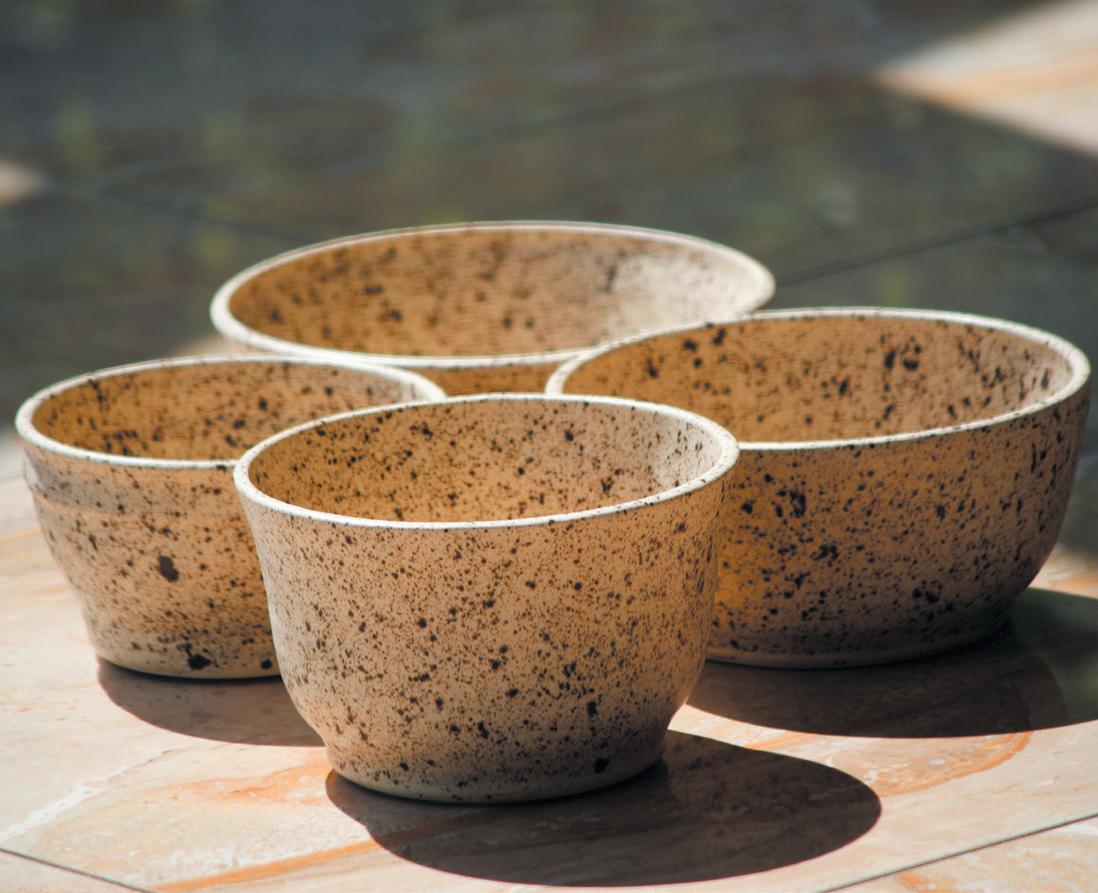
For more information about the Virginia Beach Art Center, visit artcentervb.org or call 757-425-6671.
A patch of mud was a source of artistic childhood inspiration for clay artist Sherry Stainback of Fluvanna County.
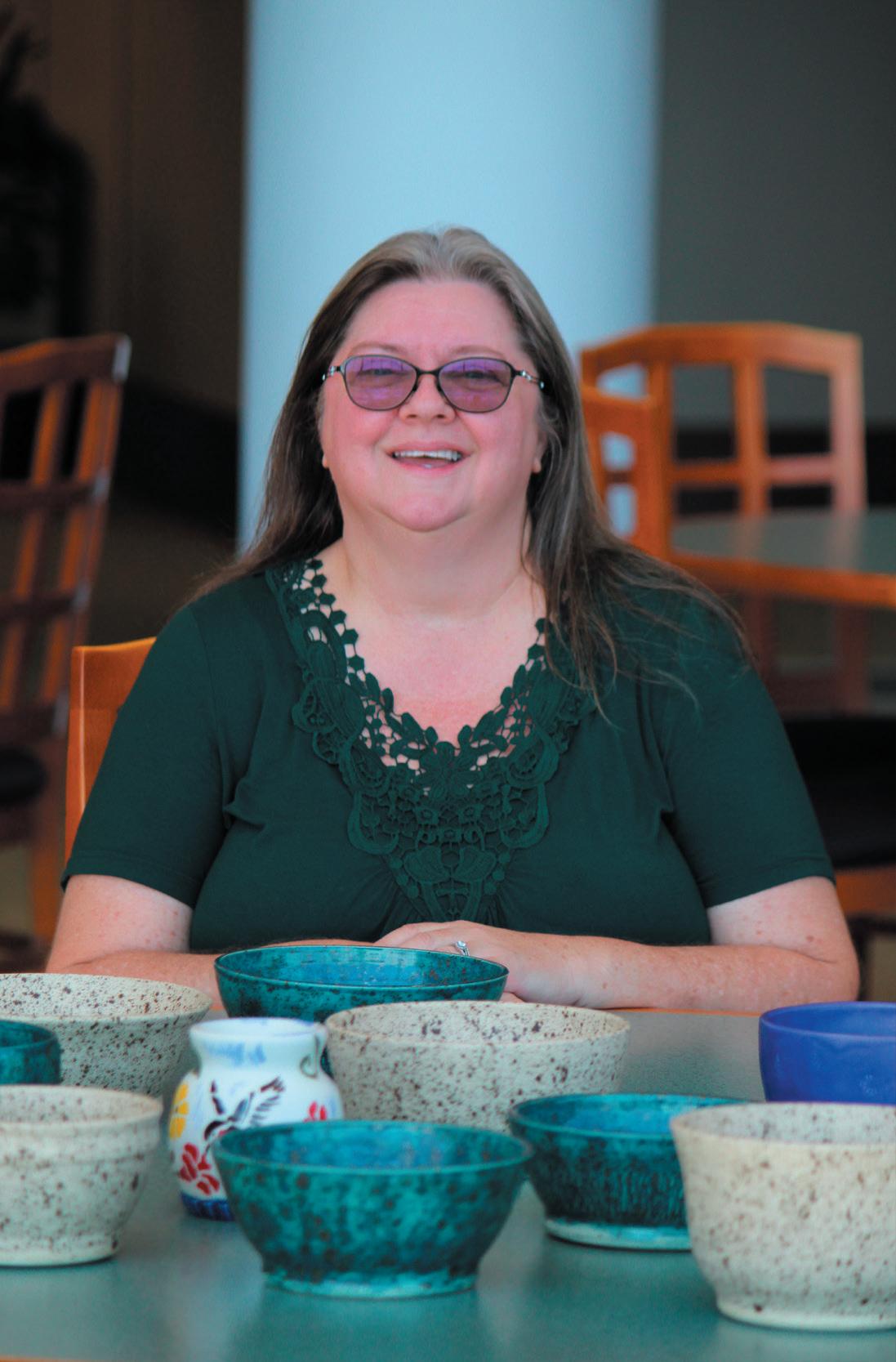
“All kids played in mud,” she said. “But I was always trying to make something with it.”
She rediscovered her knack for clay work in adulthood after enduring a difficult personal loss.
“When my mom passed away in 2006, I was kind of lost for a couple years,” Stainback recalled. “My coworkers mentioned they
were taking a class, and that was it for me! I found that working with mud is really good for your brain and emotions.”
Stainback and her husband, Ray, transformed their smallest bedroom into a pottery studio in their home. Once the bowls are dry, she drives them across the property to her mom’s house, where they installed a kiln in the kitchen.
“It generates all that heat, but it hasn’t melted anything!” Stainback explained. “Close the lid and fire it. It’s a long, slow process, gradually heated. If you open it too soon, it can cause a piece to crack
or explode. You don’t want that on your face. We have a healthy, healthy respect for 2,000 degrees!”
She takes the fired pieces back home to glaze, and fires them again to set the colors.
“Before you glaze, it can be really muted,” she said. “But when you open the kiln the second time—wow!”
Research by faculty and students at Virginia State University is helping small-scale and limited-resource farmers succeed.
ARTICLE AND PHOTOS BY ADAM CULLERApproaching its urban campus from Interstate 95 in southern Chesterfield County, it’s difficult to visualize Virginia State University’s broad influence on Virginia agriculture.
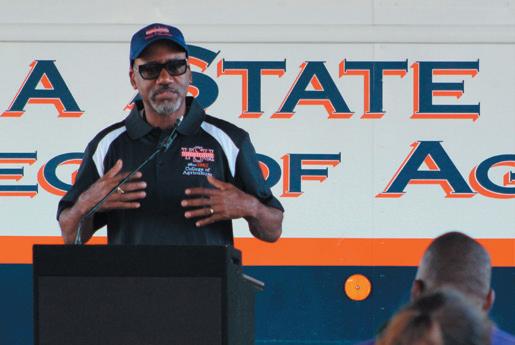
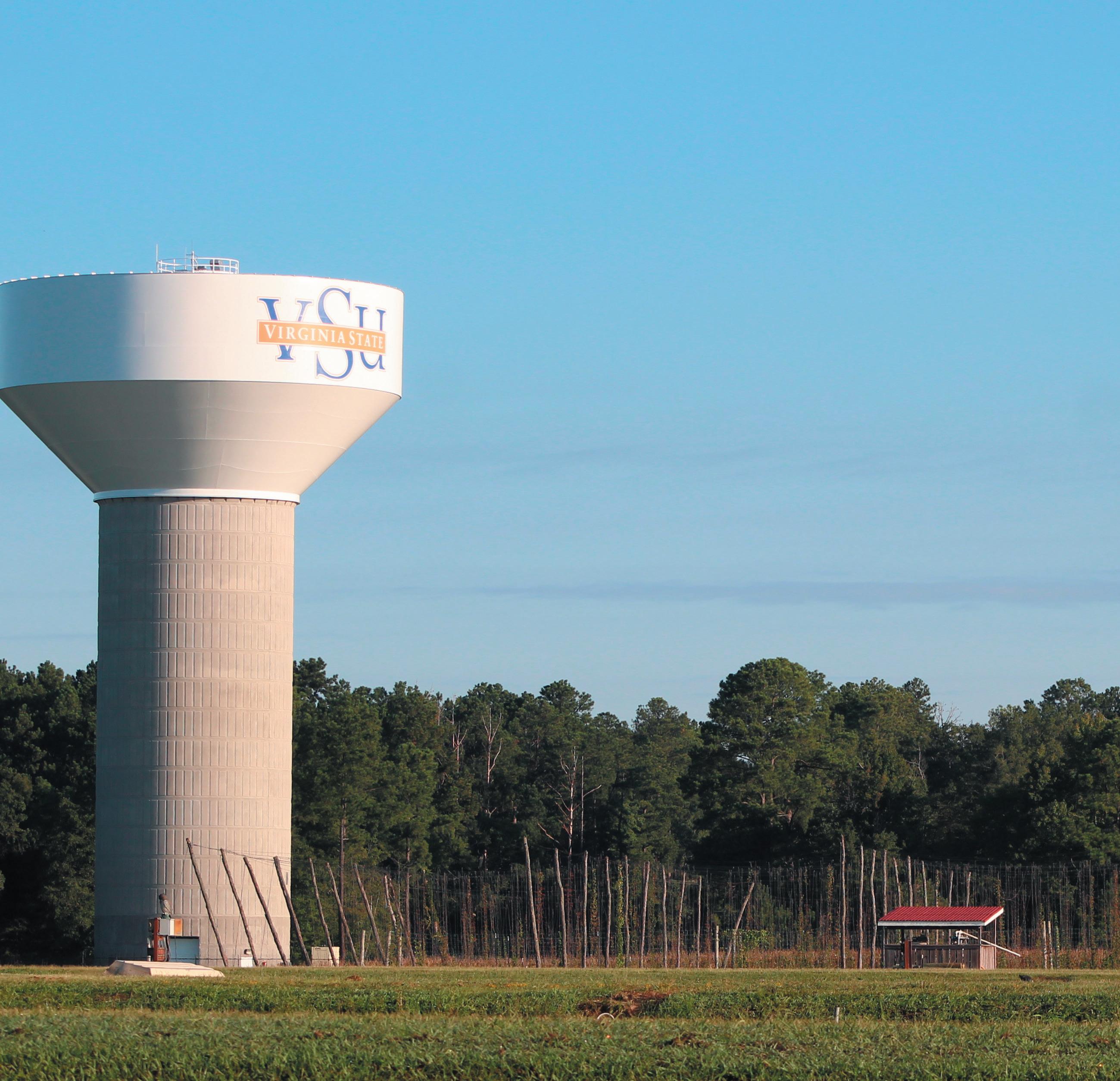
Yet, situated on the fringes of the historic
campus, VSU’s Randolph Farm is the central hub for a wealth of agricultural research.
Field research conducted on the 416acre farm includes work on alternative cropping methods, animal and aquacultural production, high-value niche crops,
horticulture, nutrient management and water quality. Additional lab research is carried out in the university’s M.T. Carter Building, which is undergoing a facelift to add 13,000 square feet for agricultural research and food production labs.
Virginia State, like
Research conducted at Randolph Farm includes work in the fields of aquaculture, aquaponics, field crops, hydroponics, small ruminants and specialty crops. VSU faculty like Reza Rafie, center, and Chyer Kim, at right, share the university's research findings through field days and through VSU's Mobile Education Unit.
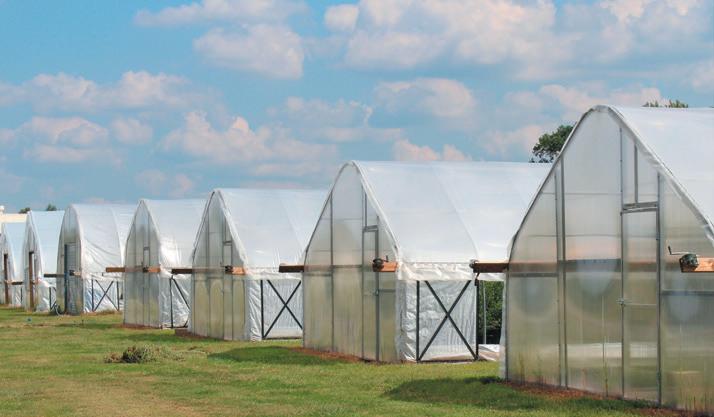
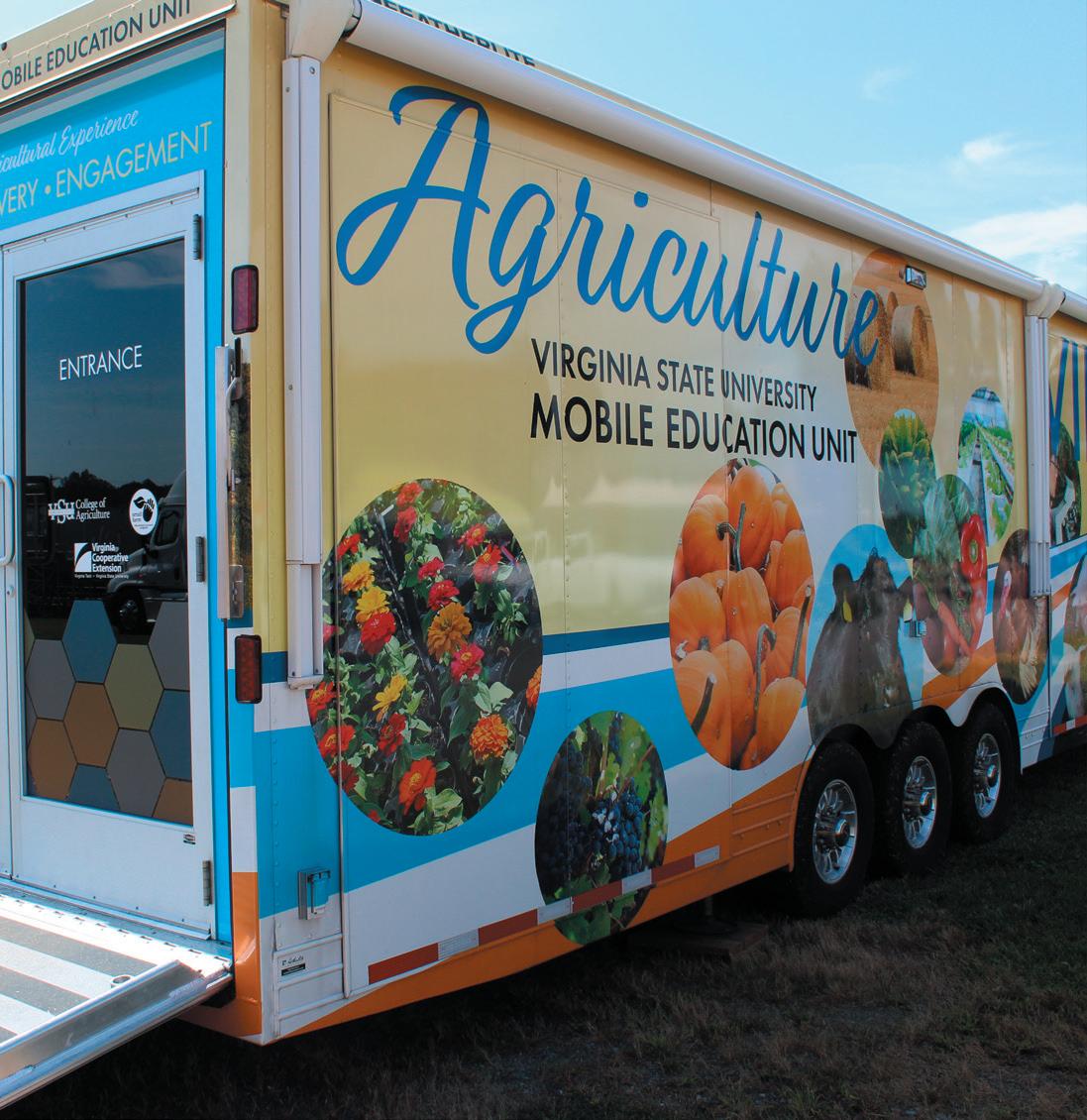
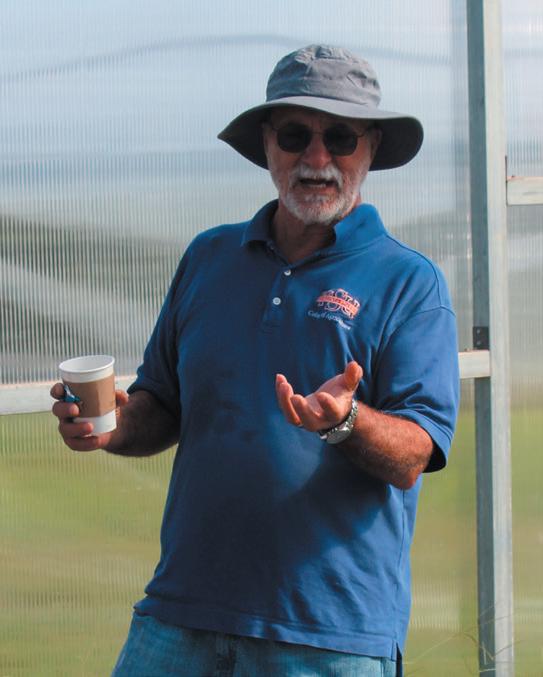

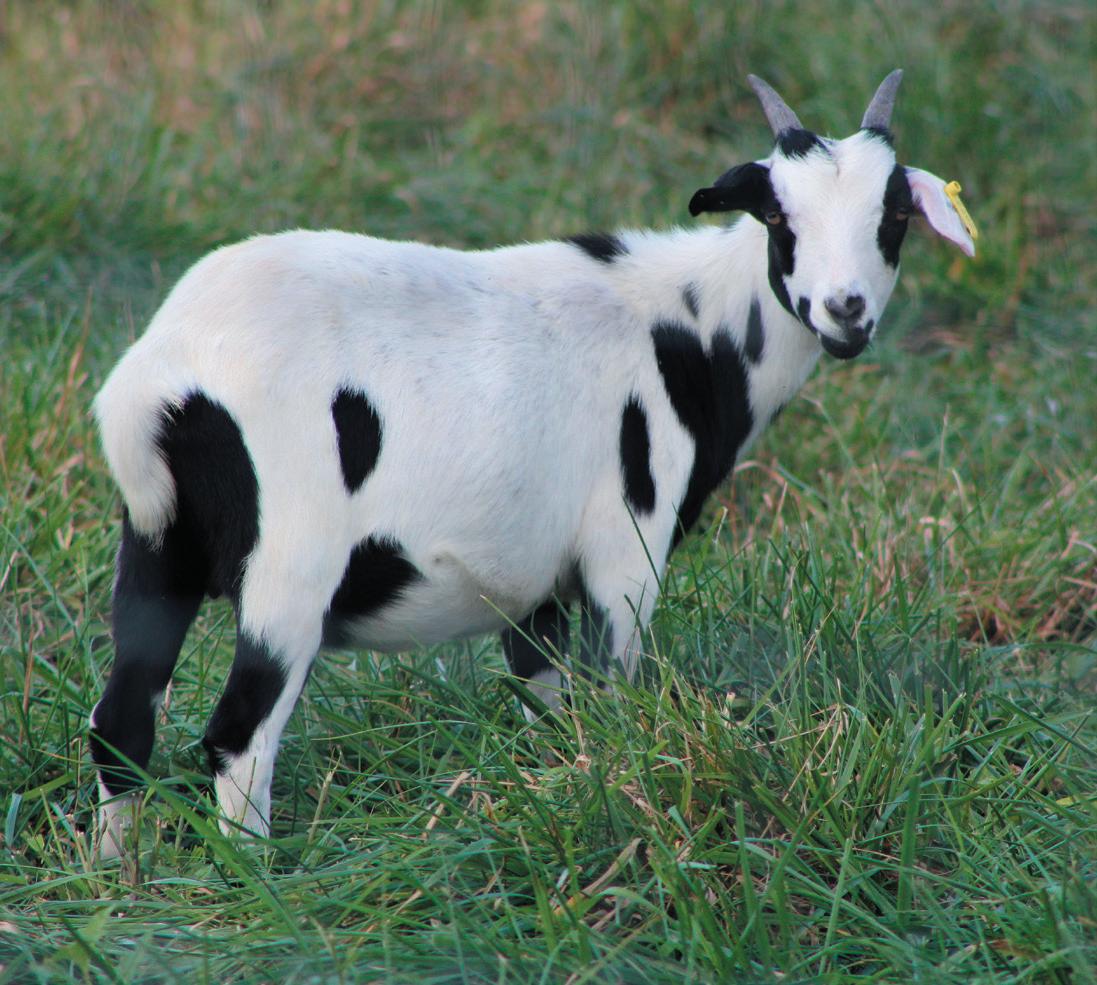
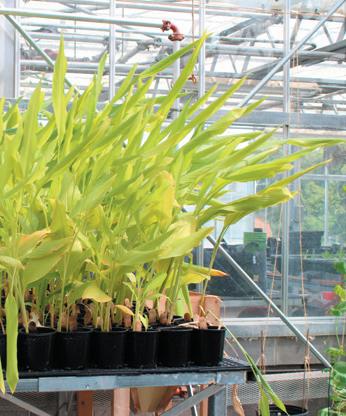
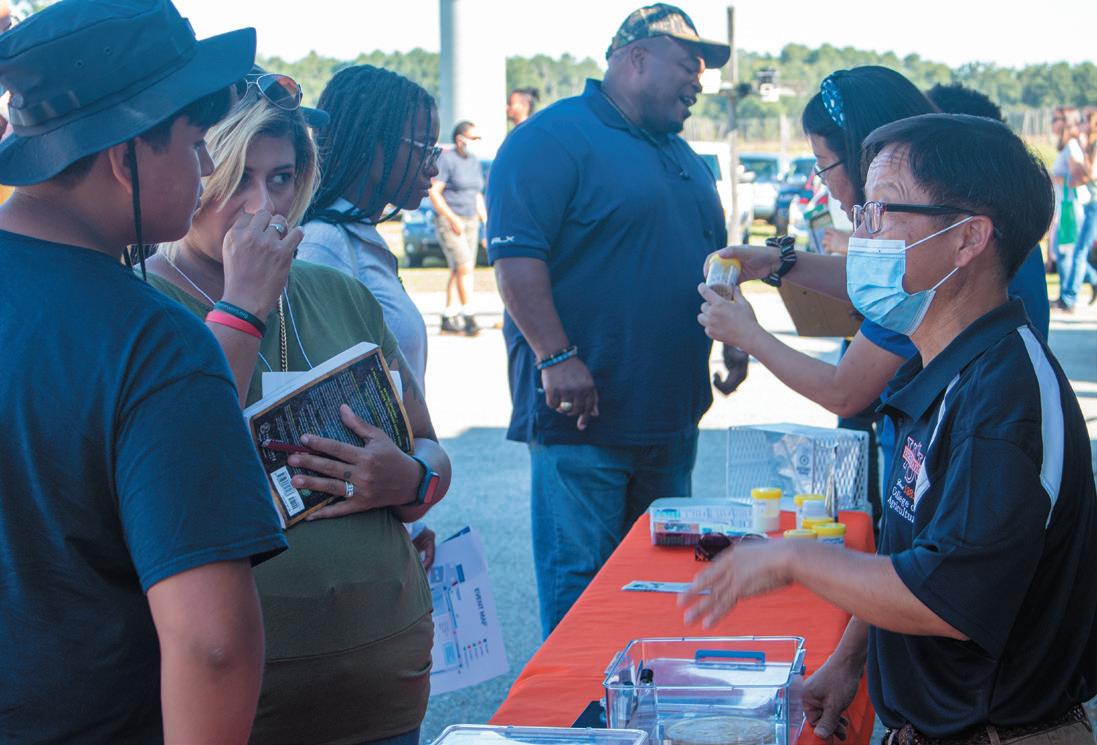
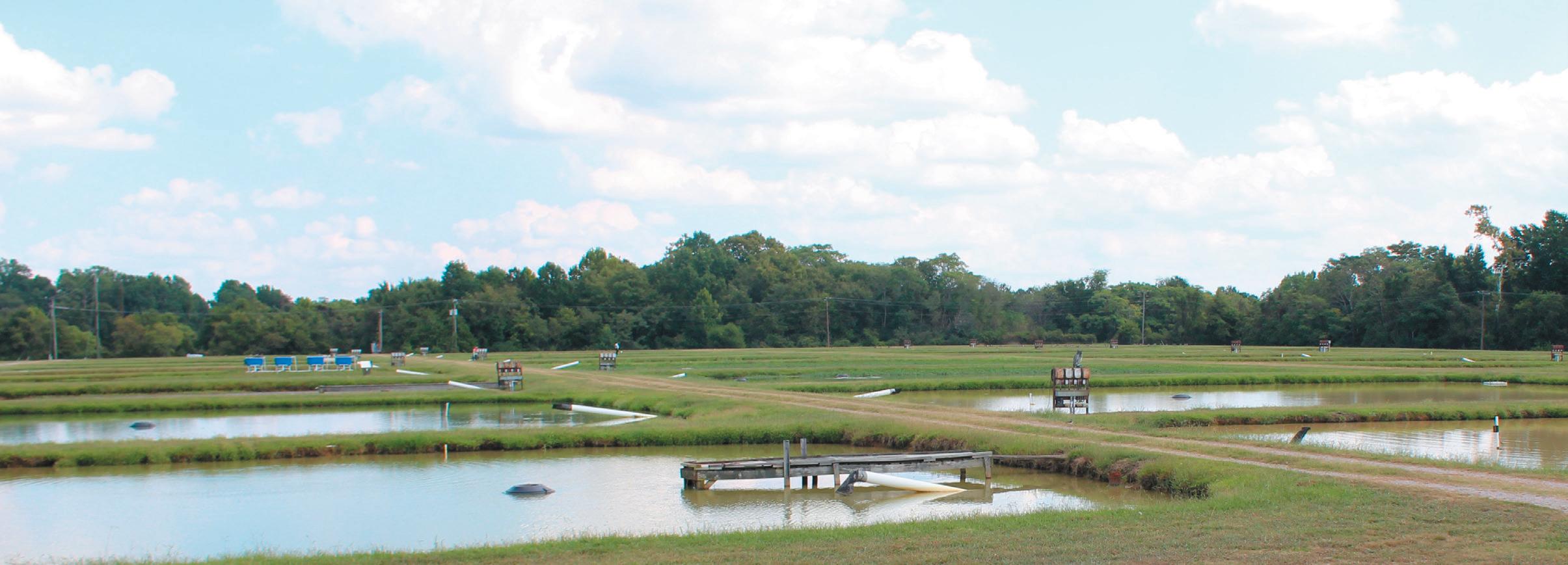
Virginia Tech, is a landgrant university. As such, the Agricultural Research Station within VSU’s College of Agriculture is responsible for producing research-based, educational resources to help improve the lives of Virginians and their communities.
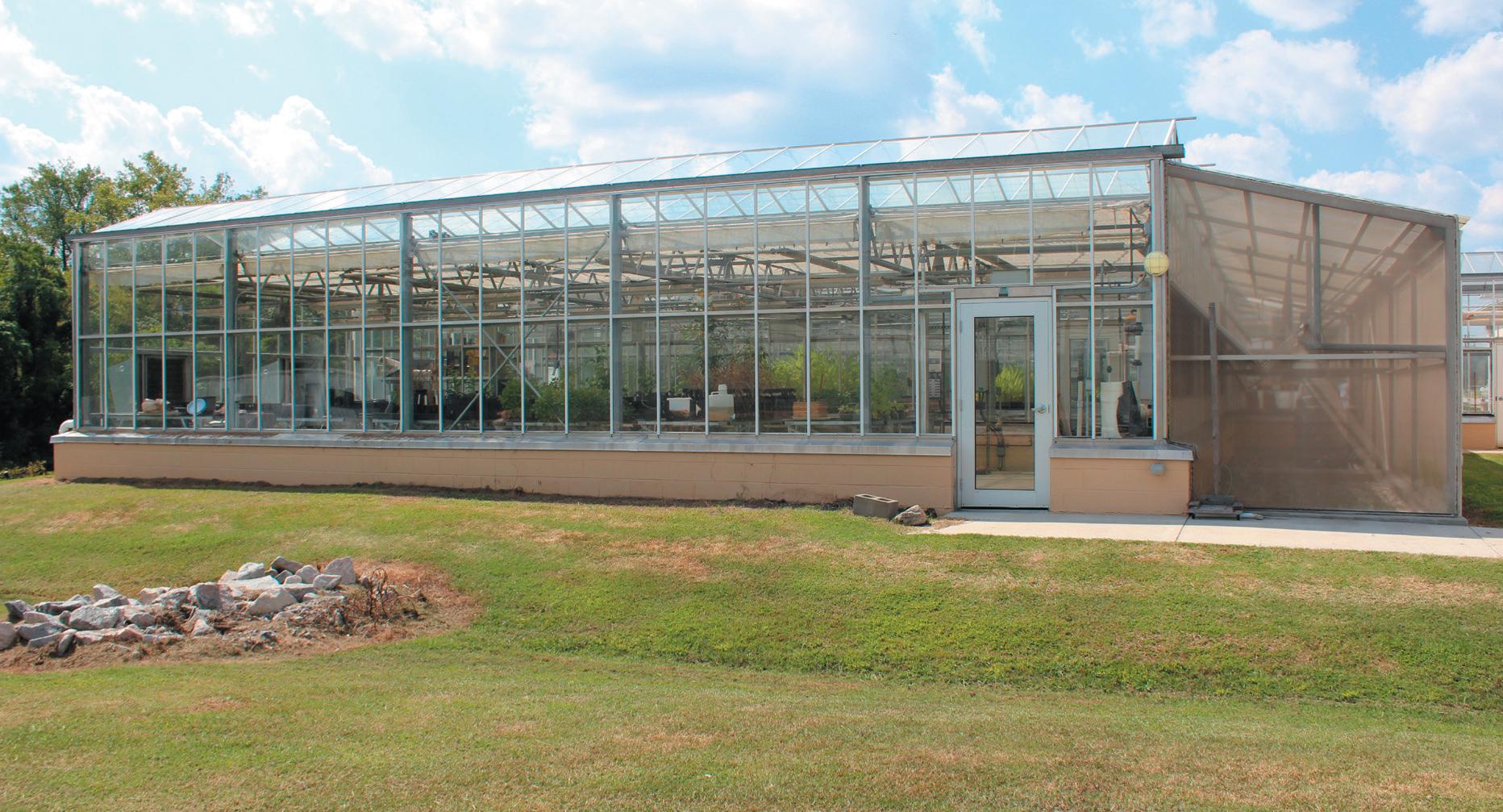
In the case of VSU’s agricultural research programs, the bulk of the research is performed with small-scale farmers in mind.
“Our core mission is to generate scientific and technical information designed to expand knowledge that will help small, part-time and limited-resource farmers be profitable,” said Wondi Mersie, director of research and associate dean of VSU’s College of Agriculture.
“Along with that mission, we also provide our students with experiential learning opportunities,” Mersie added. “On average, we have about 30 students each year who work alongside our faculty. Most students do their own research and assist us in implementing some of our research, but at the same time, they’re gaining valuable experience in their fields.”
The research station’s work is conducted in three main areas—food science, plant and soil science, and small ruminants.
The university’s food science program includes
labs for food processing and engineering, food safety and microbiology, and food chemistry and nutrition. Mersie explained the goal of the program is to develop future food scientists.
Research in the food science discipline centers on identifying and solving food chain challenges as they pertain to small-scale farmers. As part of that, the Postharvest Research Program examines methods for extending the shelf life of fresh produce and reducing waste.
Through the College of Agriculture’s plant and soil science program, plant biotechnology, plant health, soil and water quality and specialty crops are examined. Researchers identify non-traditional specialty crops that are suitable for Virginia’s climate, explore breeding methods and determine ways for farmers to incorporate exotic crops into their operations using ecofriendly growing techniques.
The objective is to help producers determine which specialty crops have the best earning potential and to learn how to cultivate them.
Crops such as blueberries, ginger, hops, hemp, sorghum, turmeric and legume varieties such as chickpeas, tepary beans and pigeon peas are studied at Randolph Farm for this purpose.
“Before we tell producers to grow this crop or that crop, we look at the market potential and what will sell,” said Reza Rafie, a longtime VSU professor and Virginia Cooperative Extension horticulture and specialty crop specialist before he retired in August. “For small farmers it’s not the growing part that is the most challenging, it’s being able to market their crops and being profitable. That’s a big part of why we research these specialty crops.”
Lastly, researchers in the university’s small ruminant labs study animal nutrition, the health and reproduction physiology of hair sheep and meat goats, and pasture ecology and management. Mersie noted the scope of this program has grown in recent years due to the increasing demand for goat meat in ethnic markets, especially those in the midAtlantic.
Findings are used to help
small-scale goat and sheep farmers form production plans to help meet the growing demand for goatand sheep-derived products.
Research is only effective if the findings are disseminated.
Virginia State researchers share results through published studies, at professional meetings and symposiums for land-grant universities, and at field days held throughout the year at Randolph Farm. Other outlets, such as the Virginia Agriculture Mobile Education Unit, are used to help connect the public with VSU’s research, as well as drum up public interest in agriculture.
“Part of our mission is to prepare the future agricultural workforce,” Mersie said. “With the Mobile Education Unit, our students and faculty can go into communities and spread the word about agriculture, and teach our youth to get involved in agricultural fields.”
Watching bulbs blossom into delicate white flowers or large colorful blooms is a delightful tradition during the holiday season.
“Having something beautiful and alive and smells so good … it takes care of the winter doldrums,” said Becky Heath, who owns Brent and Becky’s Bulbs in Gloucester County with her husband. Flower bulbs have been the family’s business for three generations, and each fall they

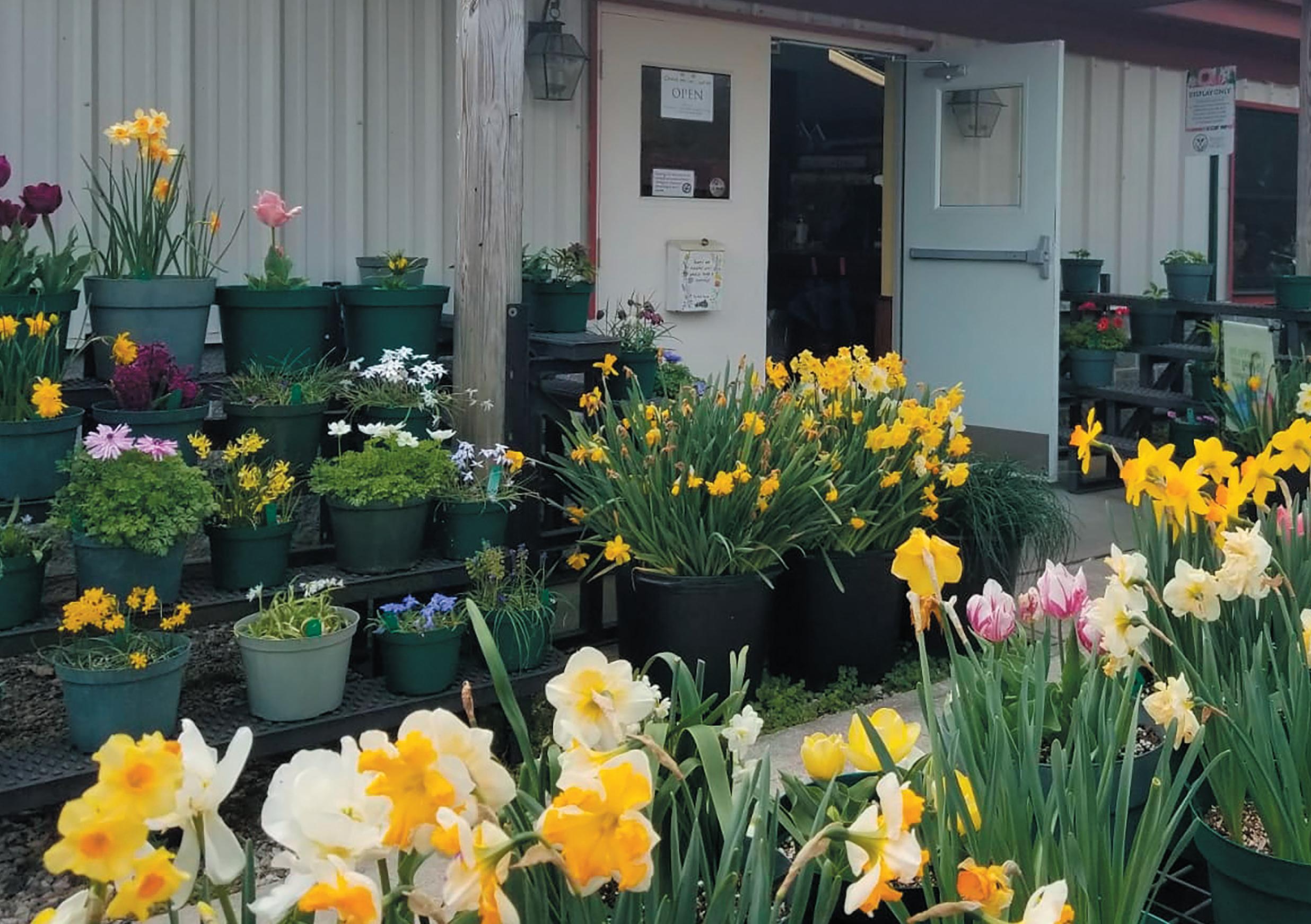
sell thousands of paperwhites and amaryllises in time for the holidays.
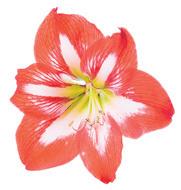
“You just put them in some water with pebbles, or you put them in soil, stick them in the window, and they start growing,” Heath said.
While they’re a traditional holiday plant in the U.S., the bulbs originate overseas—paperwhites are typically grown in Israel and amaryllises in South Africa or the Netherlands.
Millions are imported into the U.S. each year.
“We’ve got 28 different types
of (amaryllises) and eight types of paperwhites,” she said. “Ziva is probably our best seller for the paperwhites. It’s one of the first ones out and really well-known.”
Zivas add a graceful presence to a windowsill, with small, fragrant flowers topping green stems. The double amaryllis varieties, like Aphrodite and Gervase, are popular for their multiple petals that create an elegant “peony or rose look.”
Whether giving bulbs as a gift or growing in your own home, Heath said, timing is important—should they bloom for the holidays or during January after seasonal decorations are packed away?
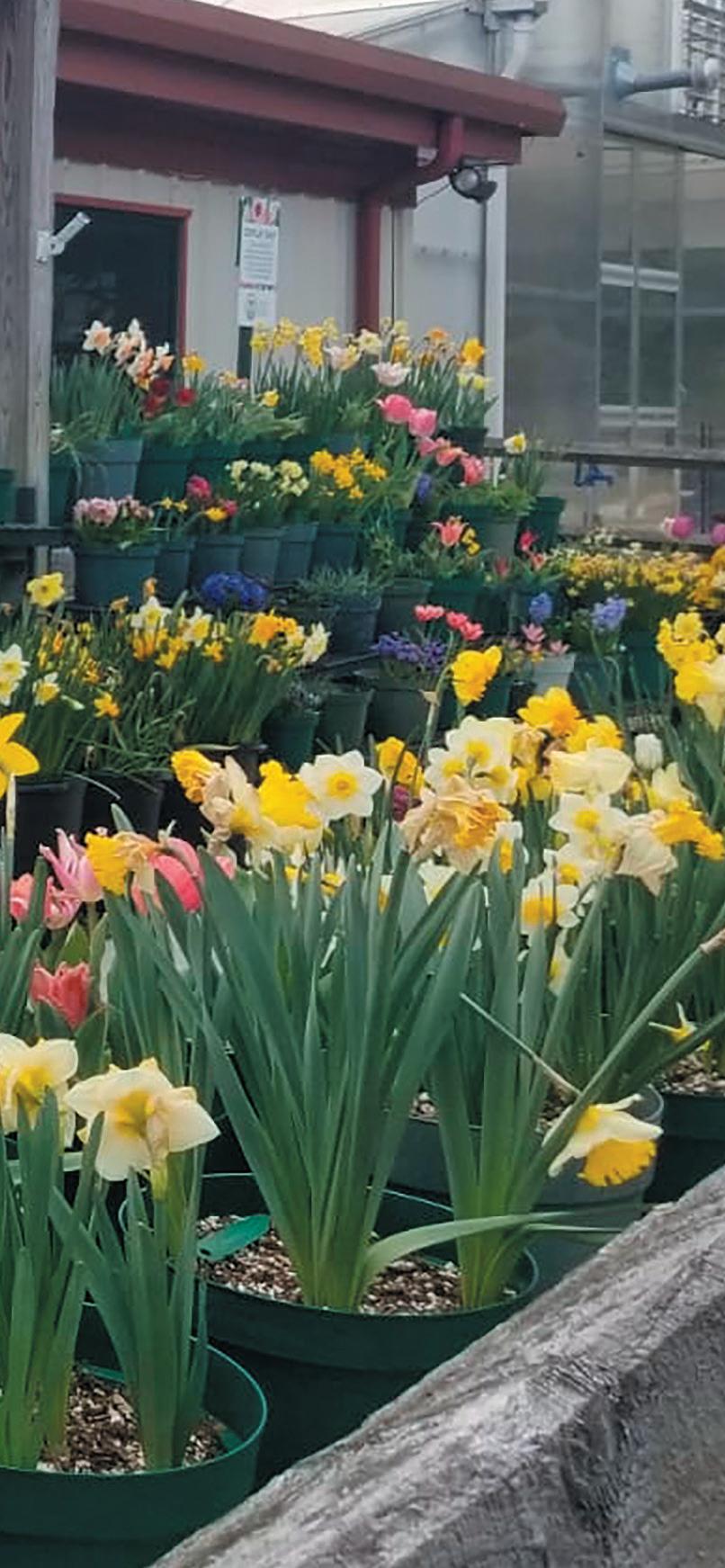
South African amaryllis bulbs from
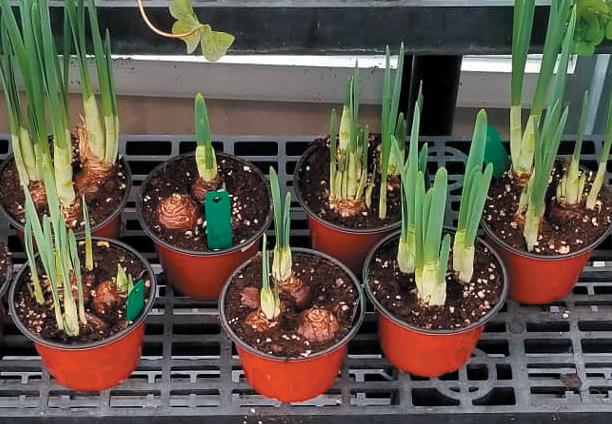

the warmer climate bloom earlier, typically in two to four weeks, whereas Dutch amaryllises take four to eight weeks. Paperwhites, depending on the variety, can bloom in two to five weeks.
As for her favorite bulb for the holiday season, Heath likes a classic.
“There’s (an amaryllis) called Merry Christmas, and it’s very traditional,” she said. “It has six petals, blooms quickly—it has the right name, and it’s so pretty.”
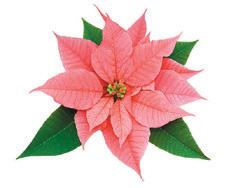 BY NICOLE ZEMA
BY NICOLE ZEMA
The poinsettias purchased from your local garden center were possibly grown by and shipped from Cros-B-Crest Farm, a family-run wholesale operation in Augusta County.
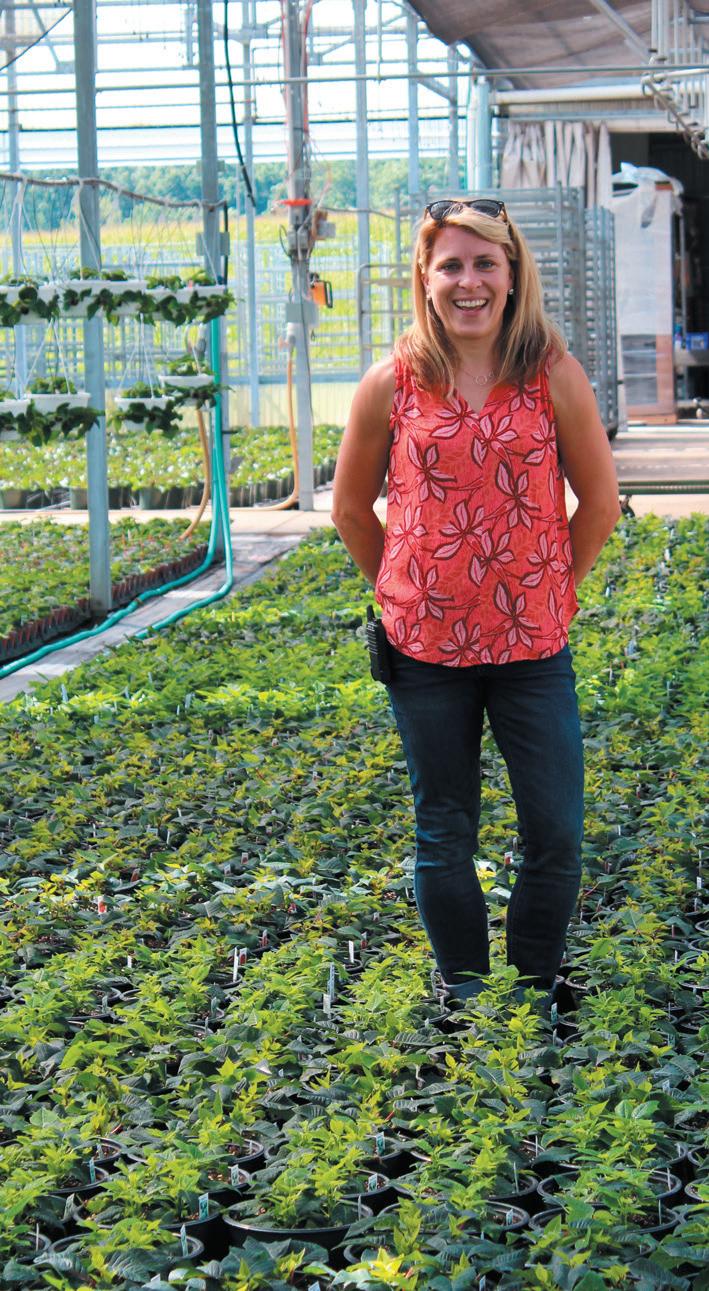
Growing 21,000 poinsettias annually, the Crosby family has been been beautifying homes, businesses, churches and community spaces since
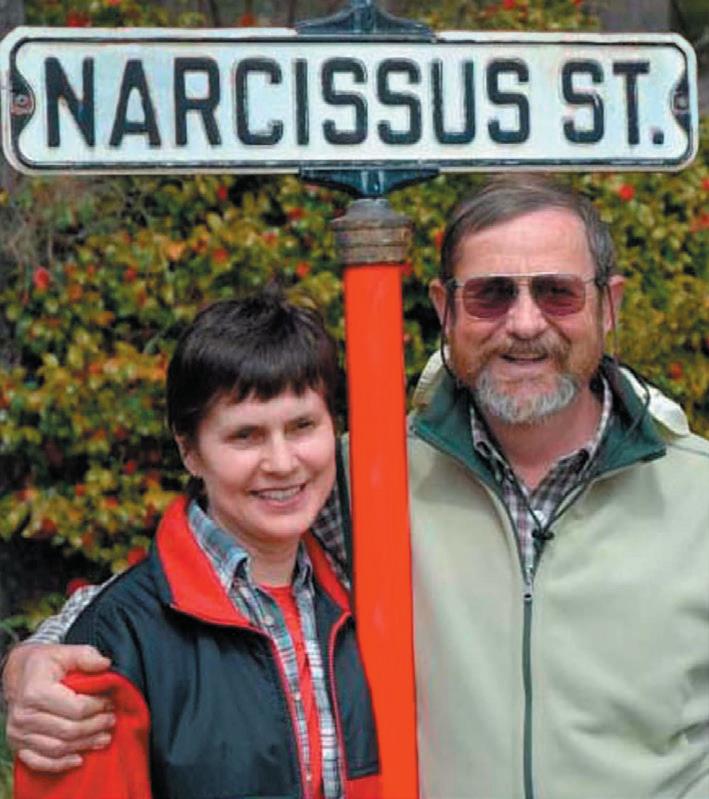
1986, supplying independent garden centers throughout Virginia and in surrounding states.
As owners Harry and Beverly Crosby pivot toward retirement, their children Maggie, Aaron and Jimmy, have stepped up to take over greenhouse and farm operations.
Enough poinsettias are grown to fulfill pre-booked orders, with some extras to serve new customers. They buy poinsettia plugs from various suppliers of rooted cuttings. In July, plugs are transplanted into pots.
“Starting in November, the plants take on color, and this is a happy place to be,” Maggie Crosby Edwards said.
The Prestige red variety is consistently their best-selling poinsettia.
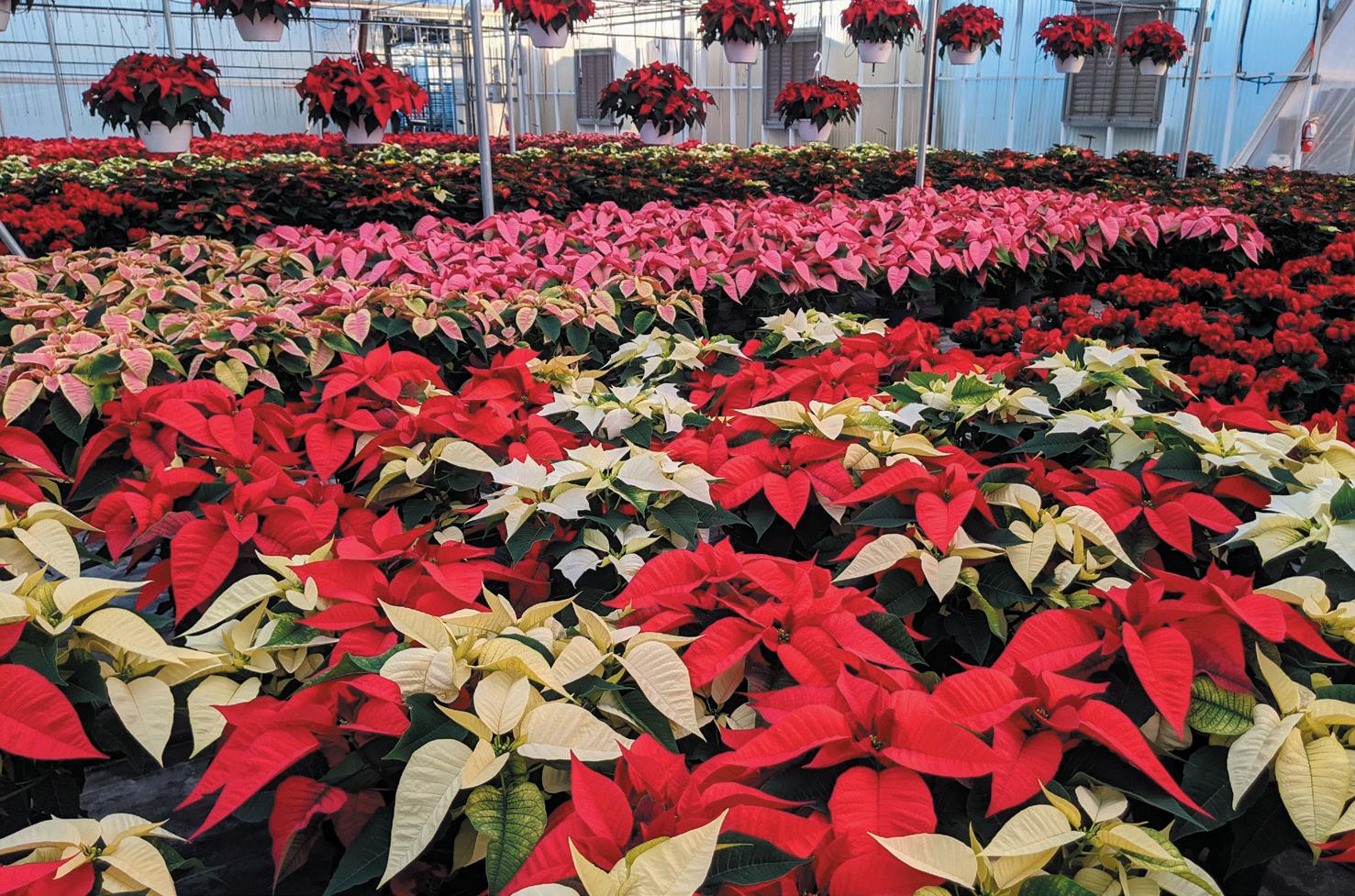
“Though there are so many varieties of red,” Edwards continued. “And we have the novel varieties. Red glitter is probably the most popular, with a speckled variation to the bracts. There’s also pink, maren, marble and burgundy, and multiple different whites.”
Some whites have a yellowish tint, others are stark. Some cultivars are bred for size.
Edwards said the houseplants are a timeless staple for the holiday season.
“Go back and watch Home Alone,” she said. “You’ll see a poinsettia in every scene! I would love the market to get back to that point, when we had poinsettias in every room.”
Some Oaxalis are a symbol of luck and are popular indoors and for gifts, Heath said. The burgundy triangularis variety adds nice color, and the Iron Cross variety has unique green leaves and purple cross-shaped markings.

Low-maintenance succulents that bloom during early- to mid-winter, Christmas cacti are festive with colorful
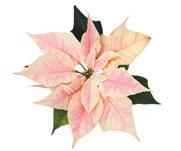
Edwards offered some advice for enjoying your plants throughout the holiday season and beyond:
• Poinsettias can’t tolerate Virginia winters or direct heat. Keep plants away from heaters or fireplaces. Choose a sunny indoor spot, and don’t overwater.
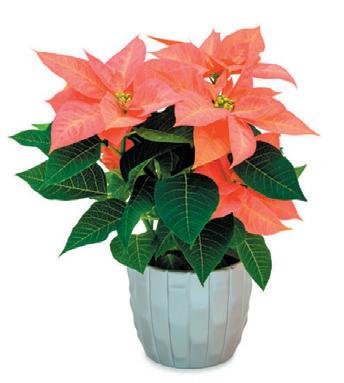
• Keep your poinsettias year-round. Mimic short days and long nights by placing the plant in a dark closet from sunset to sunrise to initiate re-coloring.
• Poinsettia toxicity to pets is mostly misconception. According to the American Veterinary Medical Association, pets may experience an upset stomach from eating the plant, but it is not poisonous.
pink, red or white blooms against green stems. Like poinsettias, they start flowering when the nights get cool and the days shorten.
Cyclamens make an attractive holiday

table centerpiece with butterfly-like flowers that extend above heart-shaped leaves. The winter-blooming houseplant enjoys cooler temperatures, bright indirect light and moderate watering.
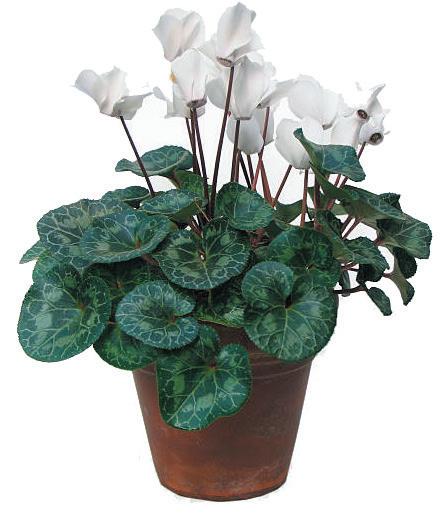
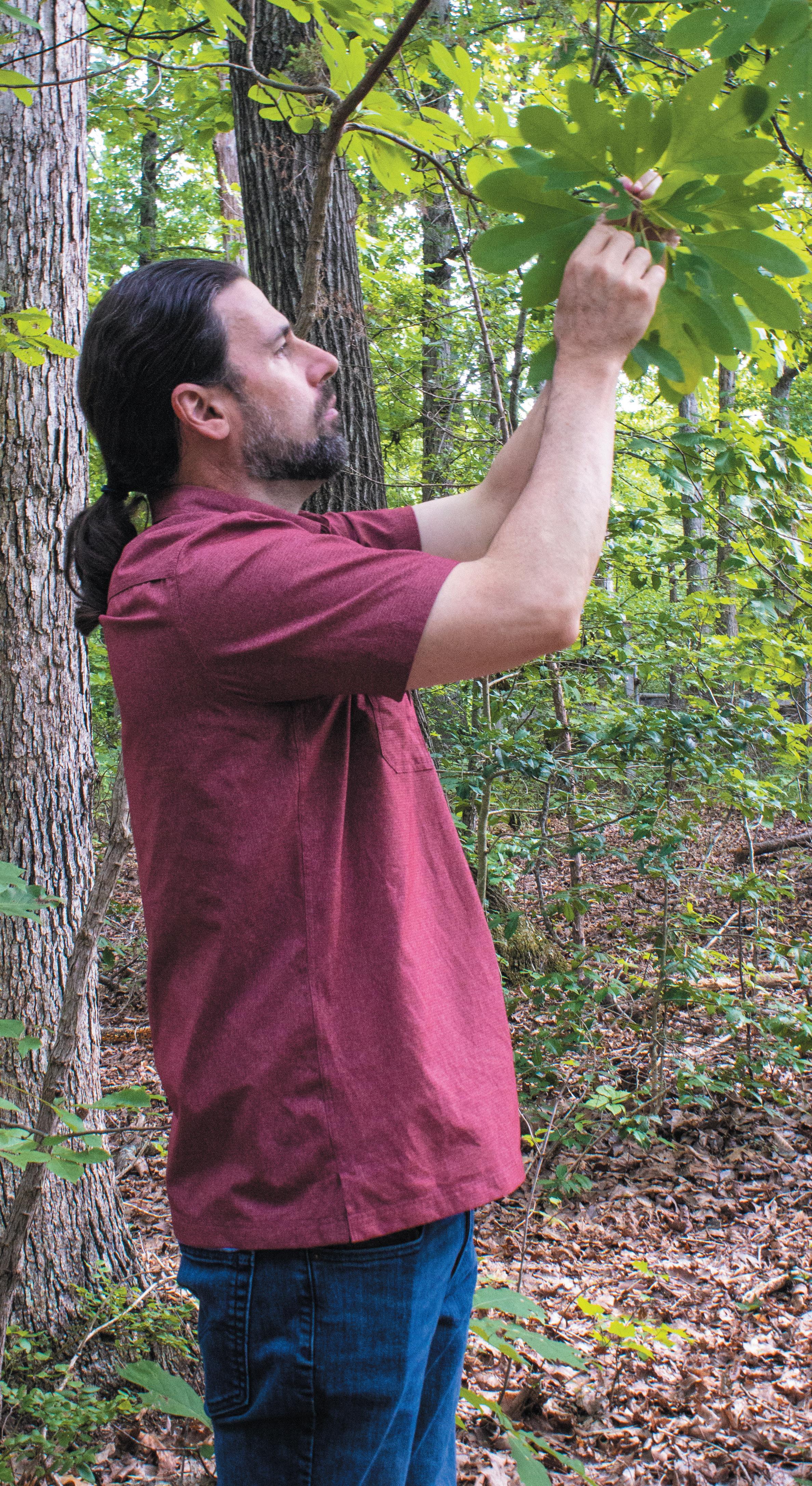 ARTICLE AND PHOTOS BY ALICE KEMP
ARTICLE AND PHOTOS BY ALICE KEMP
Walking alongside Tim MacWelch on his Fauquier County property is like going on a treasure hunt. Searching the land for what some may consider inedible weeds, he finds beneficial wild food sources.
“Chicory is the one with the blue flower,” he said, pointing to a cluster of tall, scraggly stems dotted with purply-blue flowers. “You can eat the leaves just like you can eat dandelion leaves, and the roots can be used as a coffee alternative.”
The leaves aid in digestion and mix well in a salad, he said. Chicory roots can be roasted, ground and brewed like coffee—minus the caffeine.
As MacWelch grew up on his family’s farm, foraging wild greens, berries, nuts and roots “was part of the stuff we did.
“We would go collect wild blackberries, raspberries and shell black walnuts—you know, take advantage of the natural resources.”
He transformed that knowledge into a career.
Interested in self-reliance, he founded Advanced Survival Training, for which he leads educational tours about edible and medicinal plants at a nearby state park.
“Spring and fall are really the top two seasons for most foragers,” he explained. “Spring is the salad season, full of tender leafy greens like curly dock, which can be prepared like spinach. Summer is ideal for berries, and fall is a ‘calorie cash cow’ with seeds and nuts like acorn and black walnut.”
Pay attention to detail MacWelch cautioned that nature provides, “but it’s also pretty dangerous. There really aren’t any rules that stick across the board. There aren’t any ways we can say ‘Oh well, if a berry has this certain feature, then it’s good to eat.’”
He teaches others to closely examine plants’ characteristics—the shape of leaves and leaf patterns, whether the stems are smooth or fuzzy, with thorns or without. Pokeweed berries, for example, are toxic and the plant is identifiable by its purpleblack berries with fuchsia juice, and smooth tapered leaves against red stems.
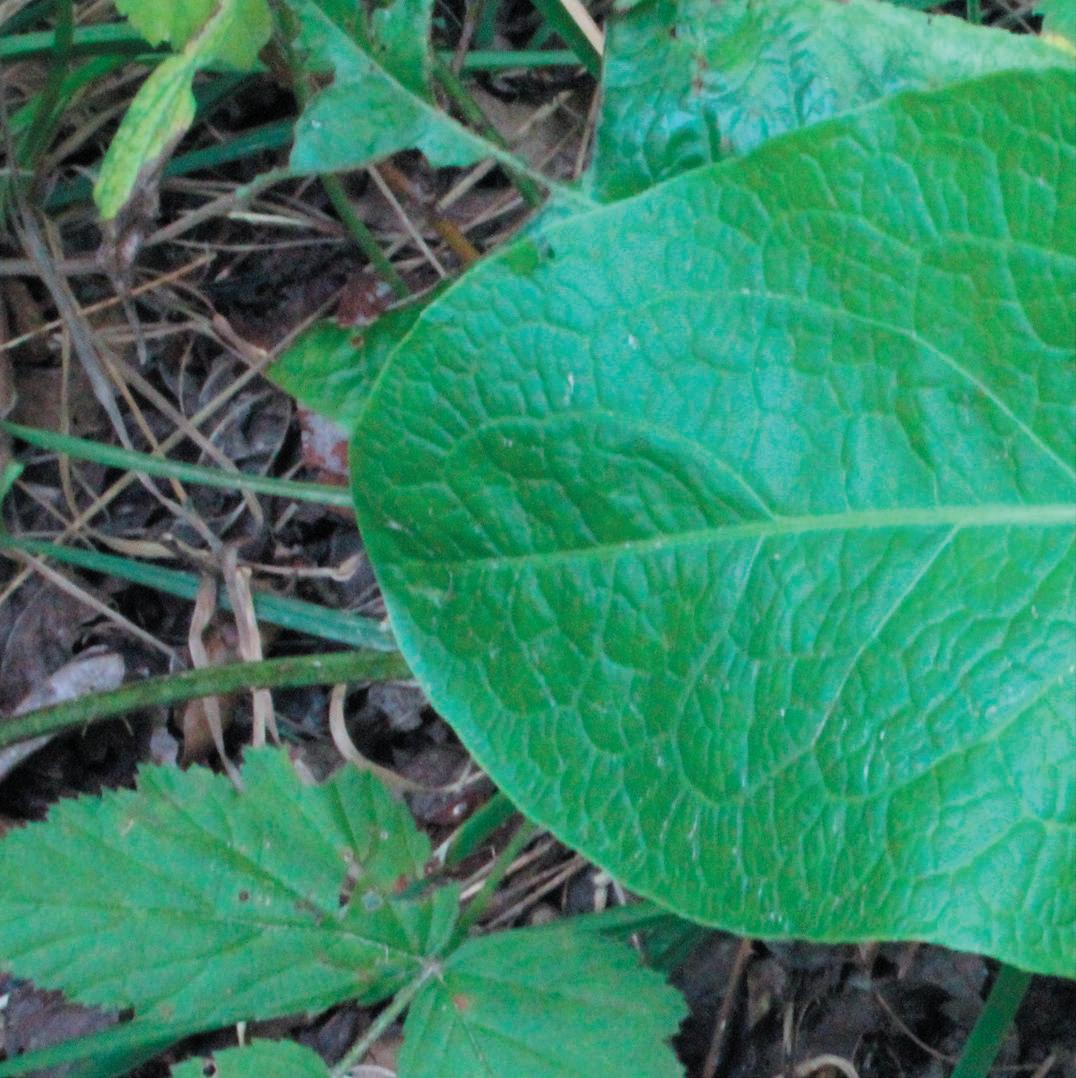
“There’s always more to the story,” he said. “We want to check out all of these before ever popping something in our mouths.”
In rural Scott County, Aaron Mazuelos forages along her family’s 200acre farm for wild mint, wood sorrel, mushrooms,
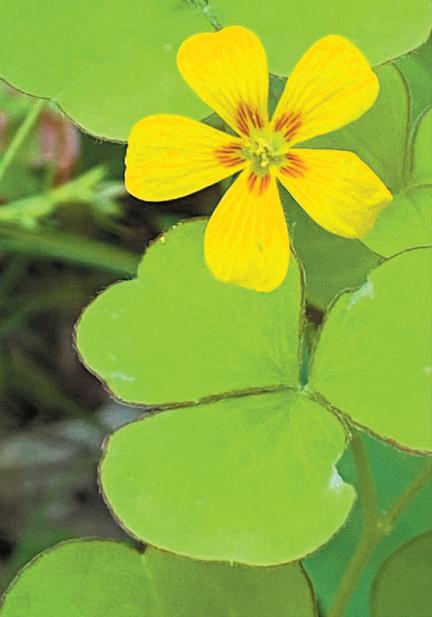
watercress and more.
“Making foods from the things you find is pretty fun,” she said.
Mazuelos makes jellies from wineberries, pesto from watercress and tea from hoary mountain mint. The mint is “good for colds and opening up your chest. I’ve chewed on it before, and your breath will be curiously strong.”
Like MacWelch, she grew up recognizing many wild edible plants and views foraging as a way to connect with her ancestors who lived on the same land. She learned more by foraging with mentors who taught her which mushrooms to pick— like chicken of the woods— and which to avoid.
“Do your research,” she said. “Find yourself a good mentor, a good website or book, and double-check everything. You want to be positive about what you’re collecting.”
“When you’re foraging, never take all of what’s there. Always leave some,” for others, and to ensure there’s more for next year, Mazuelos advised.
Also respect property boundaries, and don’t trespass on others’ property without permission, she added. If foraging in a park or forest, familiarize yourself with the rules for that specific park by checking the park’s website and contacting the local park ranger to find out what can be foraged, how much can be collected and what’s off limits.
Pokeweed, with its black berries and fuschia juice, above, is poisonous.
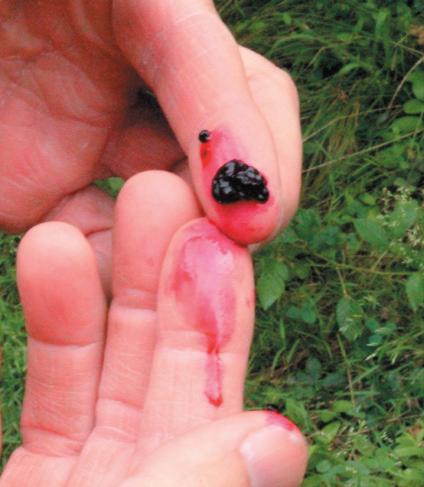
Aaron Mazuelos, center, forages for other berries that she makes into jams. She also forages wood sorrel, whose yellow flowers and leaves can be used to soothe an upset stomach.
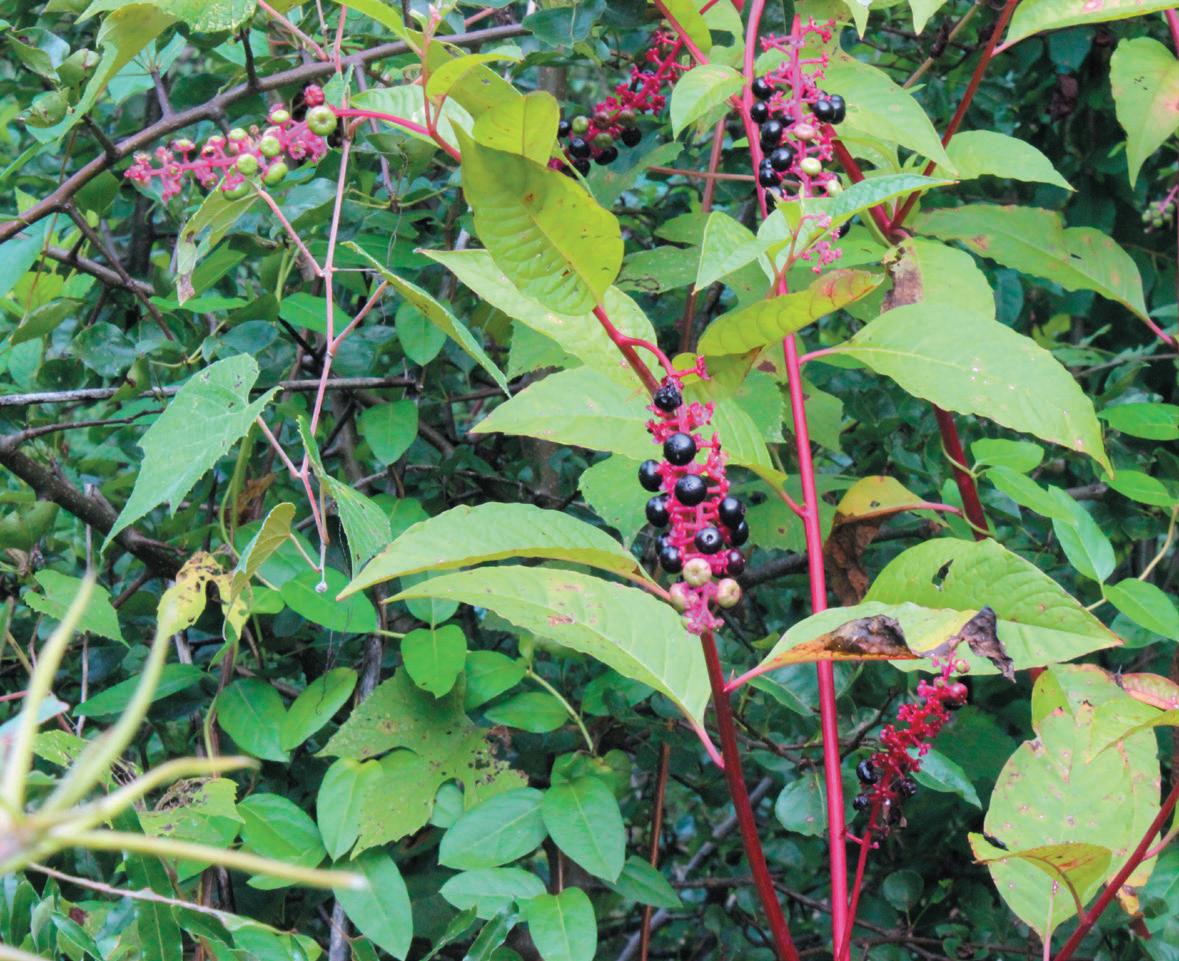
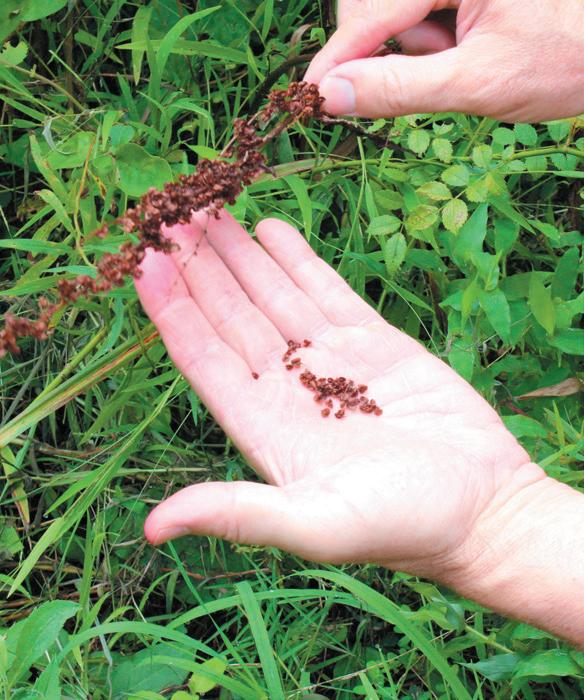
Prized for its value and medicinal attributes, wild American ginseng is a popular foraged root in Virginia forests. But its popularity has led to overharvesting and trespassing disputes, which is why there are strict rules and heavy fines for violations.
Wild ginseng harvest season begins Sept. 1 and ends Dec. 31 each year. Ginseng cannot be harvested from Jan. 1 through Aug. 31.
Wild ginseng younger than 5 years old—a plant with fewer than four stem scars on its rhizome, or fewer than three prongs—cannot be harvested.
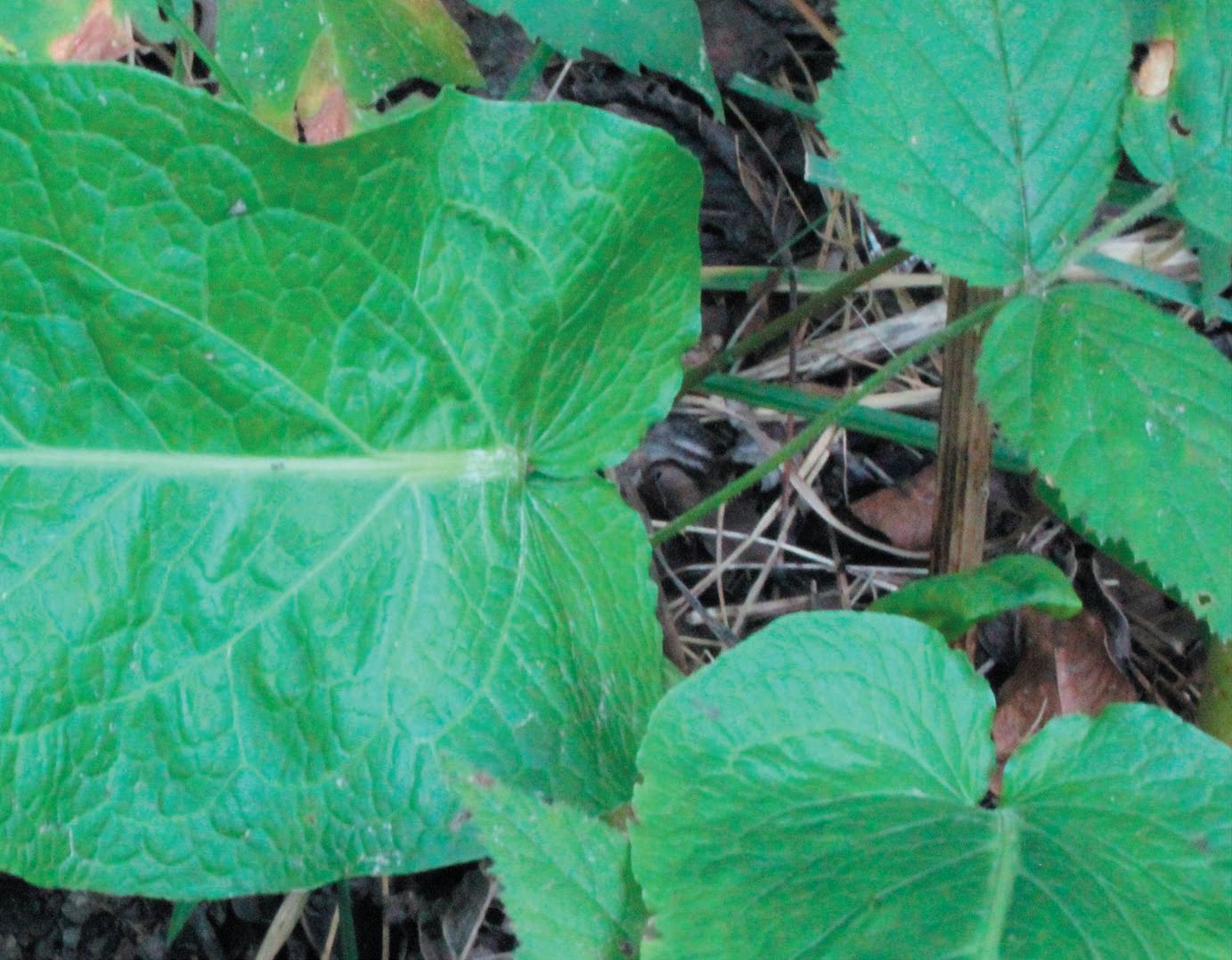
Any person who harvests wild ginseng must plant the seeds of the harvested plant at the harvest site at the time of harvest.
Ginseng collection is prohibited on most public lands and on state and national parks and forests. Where harvesting is allowed, permits are required. Ginseng cannot be collected from federal lands.
If foraging on private property, written permission must first be obtained from the owner.

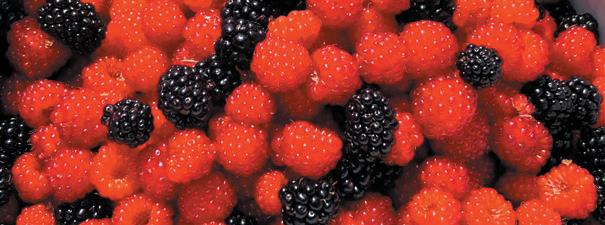
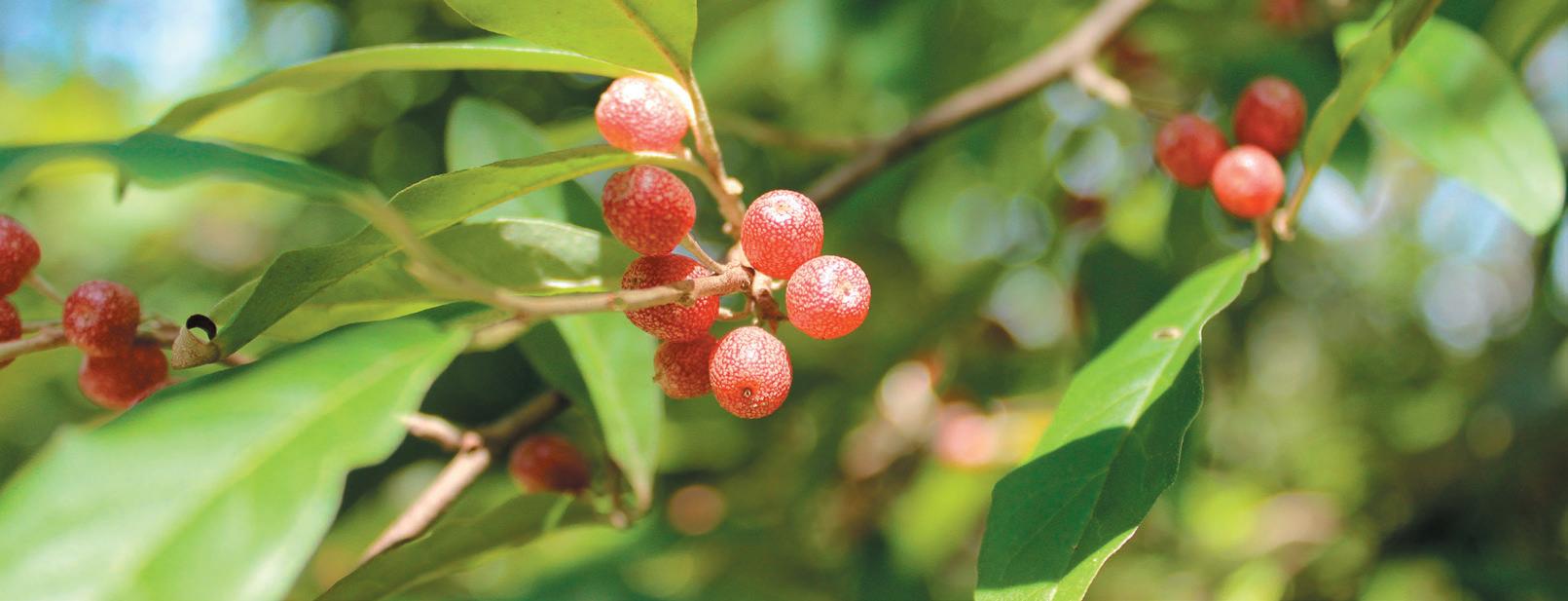
For more information on foraging and harvesting ginseng in Virginia, visit bit.ly/3wJQTd3.

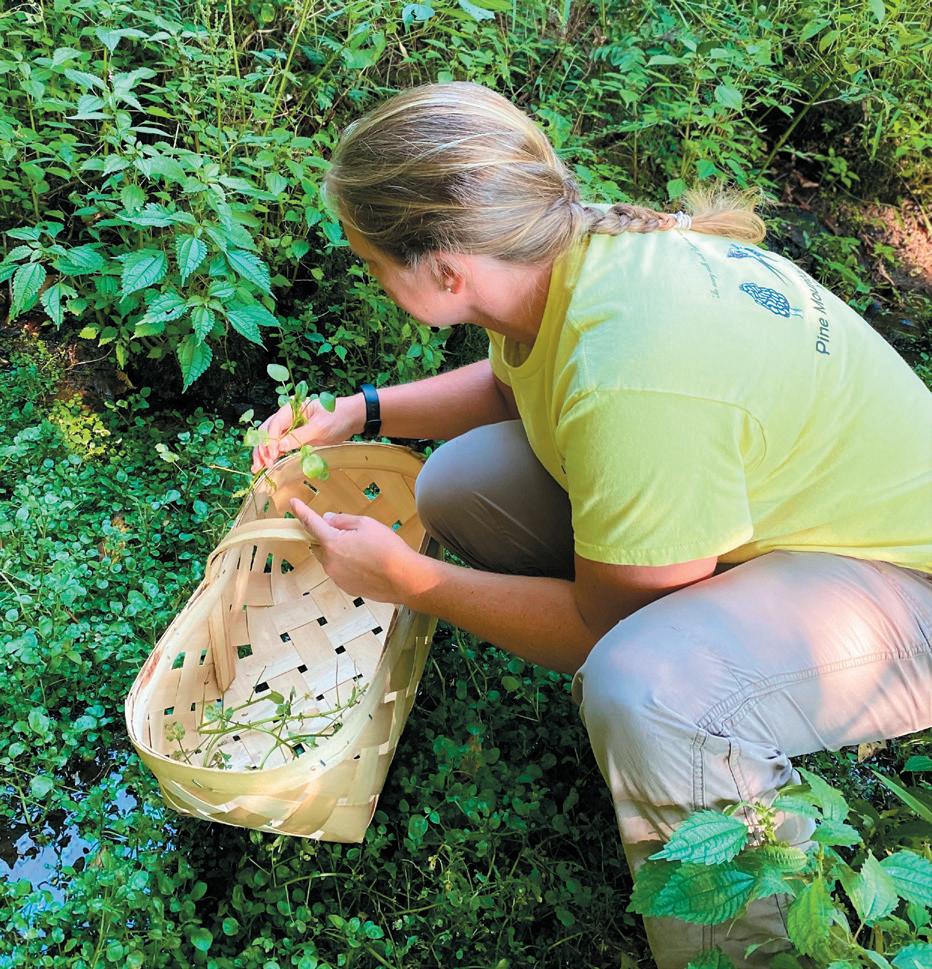
As an industry leader, Virginia Farm Bureau Mutual Insurance Co. is constantly searching for ways to stay on the cutting edge.
That’s why VFBMIC’s Claims and Underwriting & Policy Services departments began utilizing drones in 2021 to improve customer service.
Twelve Farm Bureau insurance employees now are licensed to operate drones after completing training sessions, studying and passing an exam to receive their Federal Aviation Administration Part 107 Remote Pilot Certificates. The license permits operators to fly their drones up to 400 feet above the ground, allowing employees to assess damage claims and underwrite policies.
With nearly a year of experience working with drones, employees have lauded the impact those devices have had in assisting their work.
Andrew Bochman, a senior field claims representative for VFBMIC, noted the drones have improved efficiency in handling claims, benefiting both the company’s adjusters and its customers.
“Using drones makes things quicker, because I’m not hauling a ladder around a property, setting it up and getting on the insured’s roof,” he said. “Now I just hop out of my car, fire up the drone and get it in the air, take pictures and then boom, I’m done. It’s a real time-saver.”
Bochman attested that drones not only make the claims process quicker, but the technology also helps adjusters make informed repair estimates.
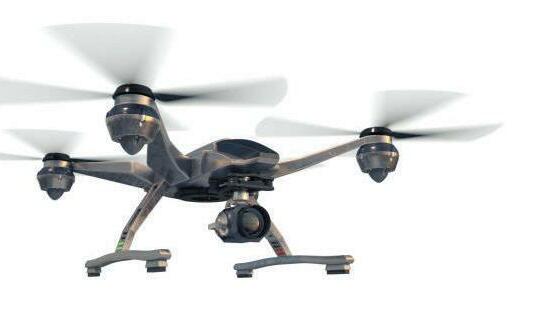
“Drones can go places where people can’t,” he added. “The camera is better than my eyesight, so it’s going to catch things that the human eye won’t. It’s so detailed that it can detect any abnormalities to the damaged property. In the long run, that helps us write up more accurate estimates for the insured.”
In addition to improving the customer experience, drones also
Virginia Farm Bureau Mutual Insurance Co. is using drones to modernize claims assessments.
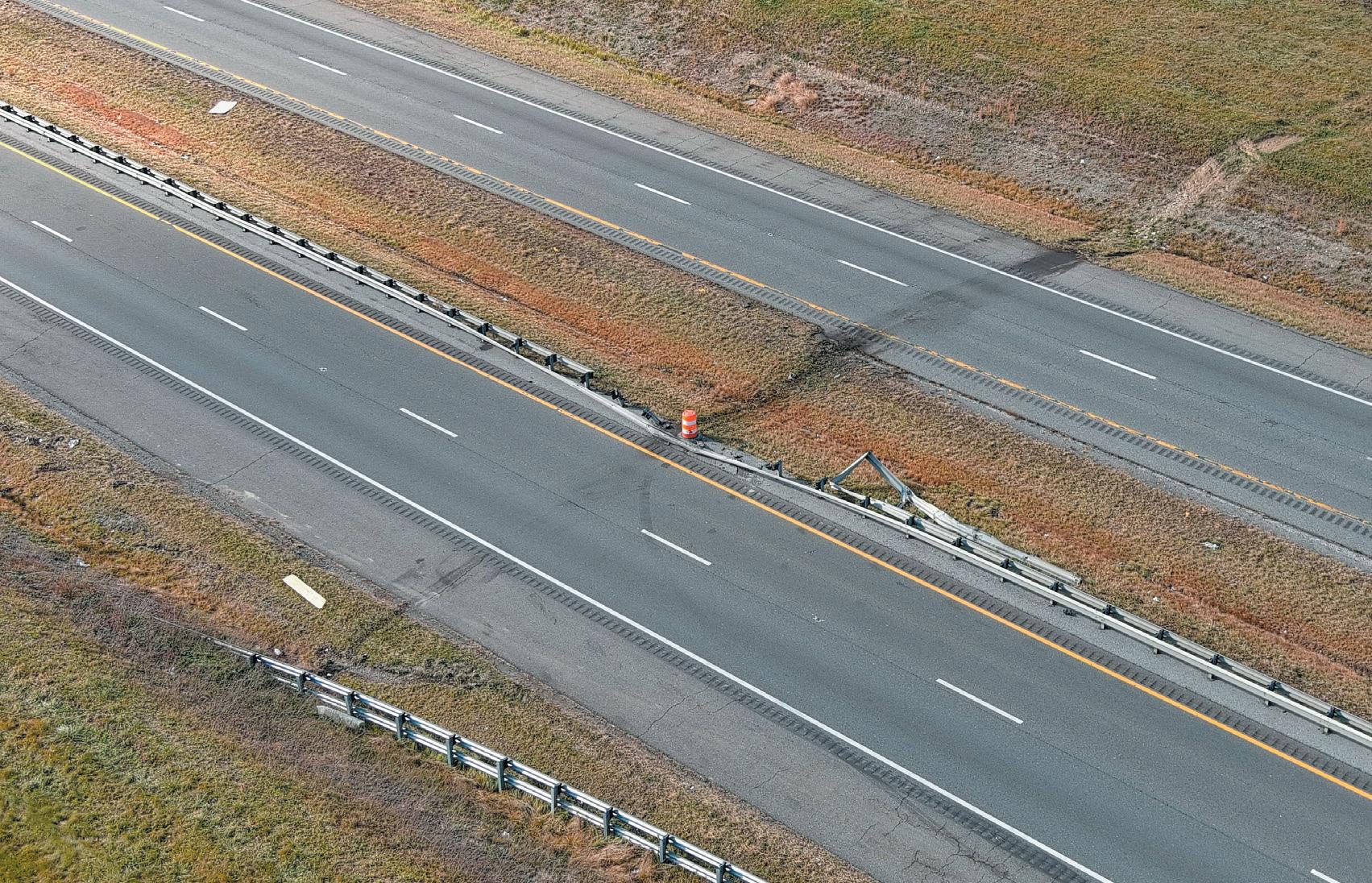
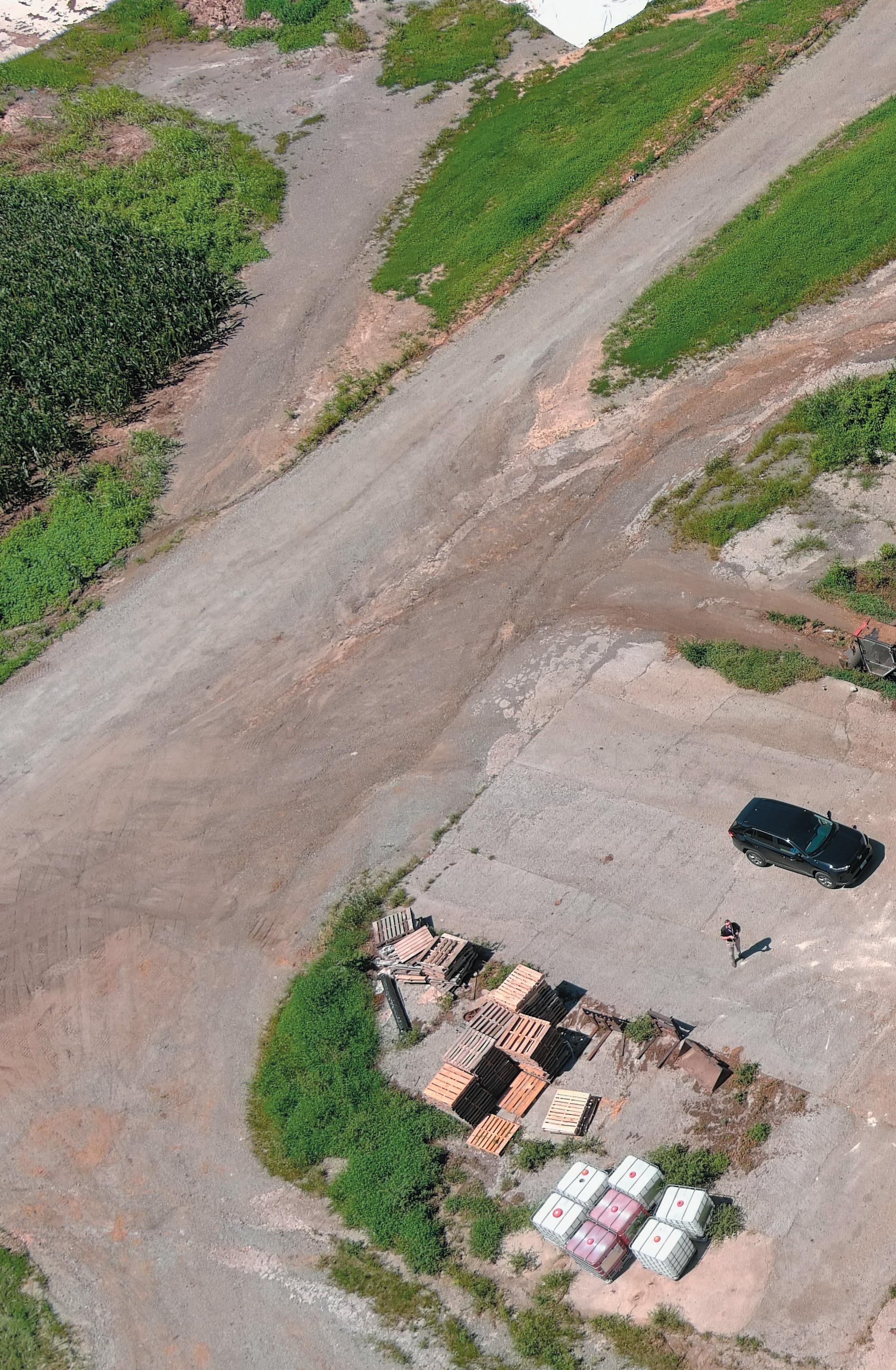 BY ADAM CULLER
BY ADAM CULLER
Clockwise from top: Andrew Bochman inspects storm damage to multiple farm structures. Operating drones keep agents safe by preventing them from climbing on damaged structures, and can assist insurance agents and law enforcement in investigating road accidents.
have improved employee safety, as adjusters no longer need to climb onto damaged property to inspect it, or trudge through dangerous terrain.
Bob Atwell, a VFBMIC senior field claims representative serving Smyth and Washington counties, agreed that drones are an effective tool in finding damage that may be obscured to someone on foot. And, with a companion app called HOVER, adjusters can view an accurate 3D render of property and structures to assess further damage.
“With the drone acting as our eyes and HOVER being our tool to provide measurements, we can do a lot of work on the ground,” he said. “In prior years, we had to get a ladder out, find a safe place to access the roof, climb up and get our tape measurers out and inspect different areas. In that regard, drones have been a very useful safety tool.”
While added safety is something for which Farm Bureau’s field representatives are grateful, improved customer experience resulting from drone use has made it successful.

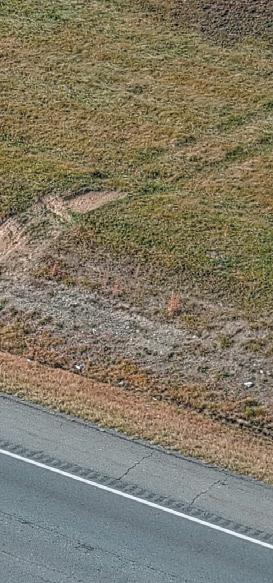
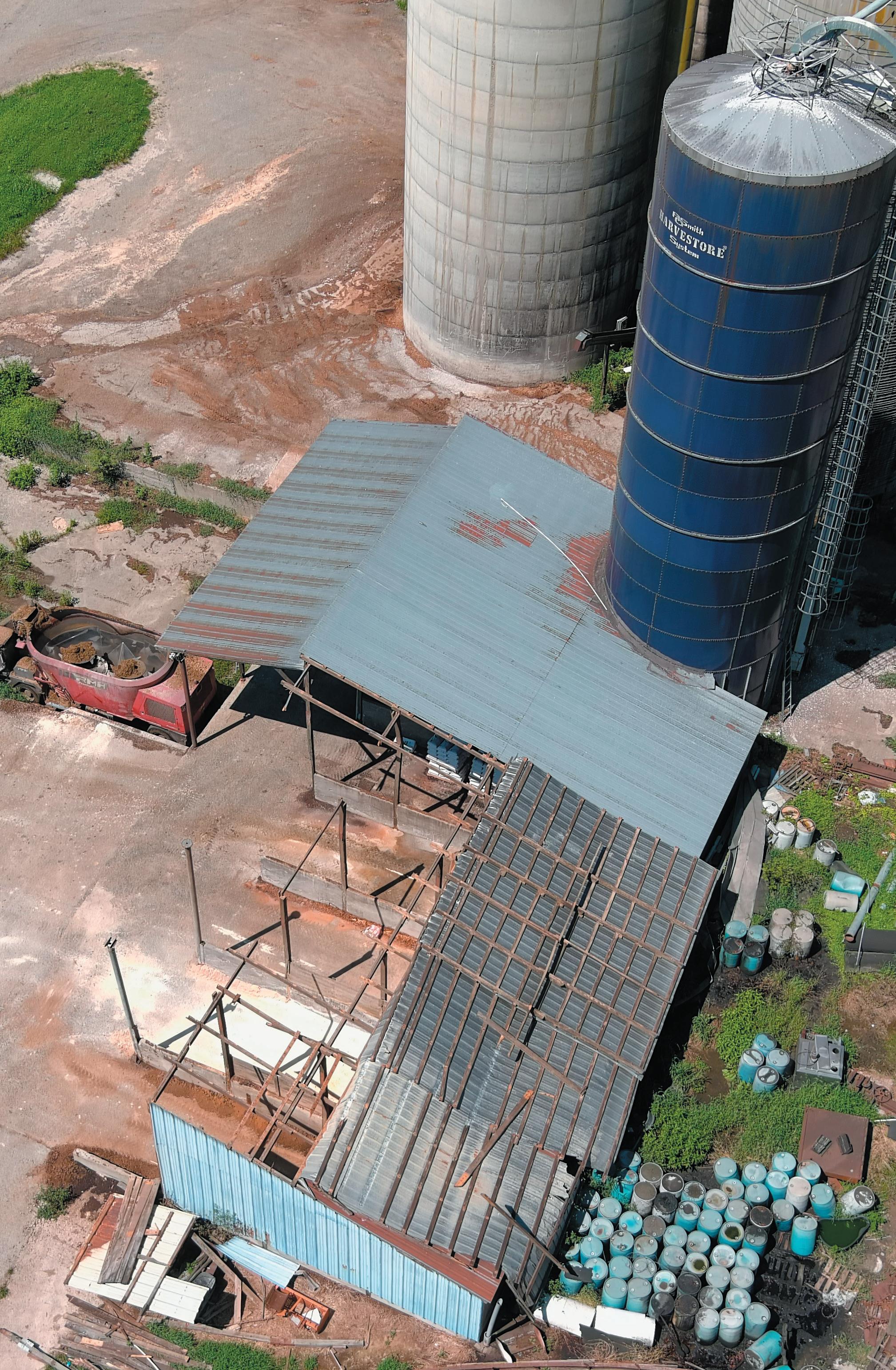
Bochman, who services the greater Richmond region, said customers get a kick out of watching him operate his drone as he conducts an assessment. The novelty, combined with the knowledge that drones can produce accurate estimates and can streamline the claims process, has contributed to positive customer feedback.
“Whether I’ve been at a customer’s home or business and I’ve taken my drone out, I’ve never had anybody who hasn’t appreciated the fact that we’re using technology to assist us in assessing damage,” Atwell said. “They’re a great addition to our arsenal of tools that can help customers, and drones allow us to see things we weren’t able to see before because of the height, complexity or danger to reach those places. That’s a plus for everybody.”

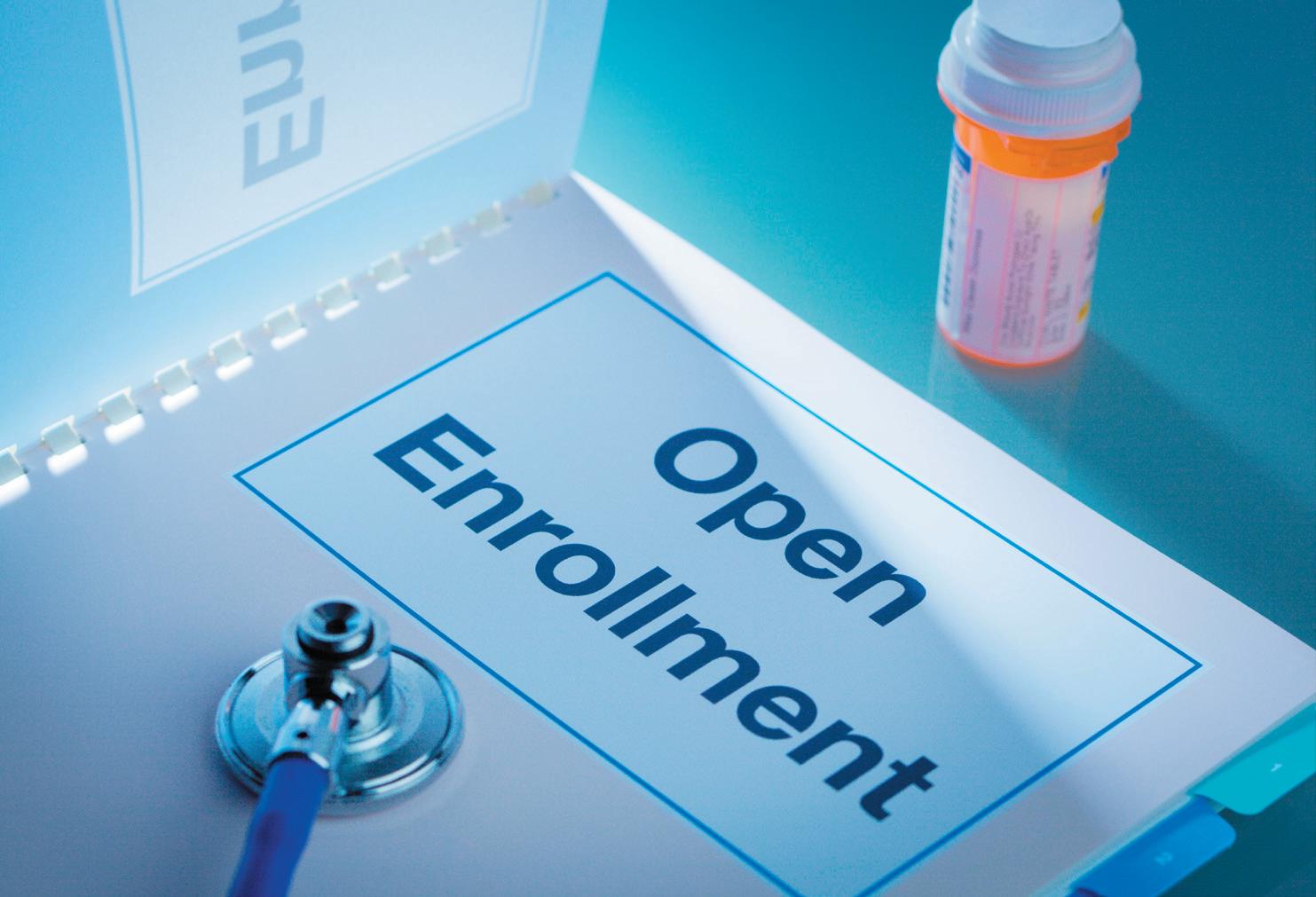
Open from Nov. 15 to Dec. 15, employers can sign up for group health coverage during an ACA-sanctioned Special Enrollment Period
During this time, employers may sign up for a group health plan for their employees without having to contribute directly toward employee premiums. Additionally, plans purchased during this window have more relaxed employee participation requirements.
The effective date of this group coverage is Jan. 1, 2023.
To learn more about upcoming open enrollment periods or coverage options, call your county Farm Bureau office or 800-229-7779.
Virginia Farm Bureau 1-800-229-7779
An authorized licensed insurance agent for Anthem Blue Cross and Blue Shield in Virginia, license number: 109534 This policy has exclusions, limitations and terms under which the policy may be continued in force or discontinued. For more information on benefits, please contact your agent or the health plan. Not connected with or endorsed by the U.S. Government or the federal Medicare program. The purpose of this communication is the solicitation of insurance. Contact will be made by an insurance agent or insurance company. Anthem Health Plans of Virginia, Inc. trades as Anthem Blue Cross and Blue Shield in Virginia, and its service area is all of Virginia except for the City of Fairfax, the Town of Vienna, and the area east of State Route 123. Independent licensee of the Blue Cross and Blue Shield Association. ANTHEM is a registered trademark of Anthem Insurance Companies, Inc. The Blue Cross and Blue Shield names and symbols are registered marks of the Blue Cross and Blue Shield Association. AADVOTH006M(15)-VA
When renting a car, often the transaction raises the age-old question, “Is rental insurance for that vehicle actually worth it?”

Simply put, most drivers don’t need to purchase rental insurance—called a Collision Damage Waiver—offered by rental companies. When individuals rent a passenger vehicle similar to one endorsed on their own personal auto policy, the insured driver’s collision and liability coverage generally follows them.
However, that doesn’t necessarily mean renters are completely off the hook if an accident occurs.
“Renters are ultimately responsible for any damages to the rental (vehicle) that aren’t covered under their policy’s collision or comprehensive coverage, such as the decrease in value or loss of use of a damaged rental vehicle,” explained Laurie Gannon, vice president of claims for Virginia Farm Bureau Mutual Insurance Co.
“Although in most cases the insured’s collision and liability coverage usually will extend to rental vehicles that are similar to their own, we still recommend customers purchase a CDW when they’re renting,” she added. “The financial protection the insurance provides in the event of a non-covered loss is far greater than the nominal fee it typically costs to purchase from rental car companies.”
While purchasing rental insurance for passenger vehicles is more of a friendly suggestion than a necessity, the advice for renting vehicles in different classes than those endorsed on most personal auto policies is much different.
Rental car insurance is not necessary, but is helpful if renting a vehicle that is different than the one covered on your auto insurance policy.
When renting larger vehicles, such as moving trucks, RVs or unendorsed trailers, drivers are strongly encouraged to purchase a CDW. Because these vehicles tend to vary from those listed on most standard personal auto policies, a driver’s collision and comprehensive coverage would not apply in the event of an accident.
Without a CDW, drivers in this scenario could face a financial nightmare.
“If you’re renting something like a moving truck or a trailer, and you only have an SUV or a sedan listed on your policy, you’re going to have a coverage gap,” said Lisa Whitus, VFBMIC personal and commercial lines underwriting manager.
“Your liability coverage for injuries
to yourself, passengers and other drivers will still follow you in those vehicles, but not damage caused to the rented vehicle itself. That’s where the CDW comes in and closes the gap.”
Unlike many auto policy endorsements, CDWs are not offered by Virginia Farm Bureau Mutual Insurance Co. However, if you are renting and need clarification on coverage you may need depending on the type of vehicle, Whitus recommended customers reach out to their Farm Bureau insurance agents.
“Nobody rents a car with the intention of wrecking it, but things happen,” Whitus said. “If you have any questions about coverage, your agent will be happy to review your policy to make sure you’re appropriately covered in your rental.”
Little announces the start of the upcoming holiday season quite like the fragrant smell of apples baking in the oven.
And Virginia is ripe with them. A staple commodity since they arrived during Colonial times, apples are grown on over 100 commercial orchards, totaling about 16,000 acres in the commonwealth. Virginia is the sixth-largest apple producer in the U.S, and the apple industry is responsible for contributing an estimated $235 million annually to the state’s economy. About 70% of Virginia apples are processed into products like apple cider, applesauce, apple butter and slices.
Of the roughly 2,500 varieties grown in the U.S., Virginia orchardists cultivate around 25, with some of the most common being Red Delicious, Golden Delicious, Stayman, Gala, Granny Smith and Fuji.
When it comes to cooking with apples, many believe one variety reigns supreme—the Granny Smith. Its tart flavor helps balance sweet recipes, and the apple’s firm structure holds up against high heat. Other apples ideal for cooking and baking include Fuji, Winesap and Honeycrisp.

eggs
cup brown sugar
sticks unsalted butter, at room temperature
cup honey
cup molasses
1 cup buttermilk
3 cups all-purpose flour
2 teaspoons ground ginger
2 teaspoons cinnamon
1 teaspoon nutmeg
½ teaspoon ground cloves, optional
2 teaspoons baking powder
1 teaspoon baking soda
1½ teaspoons salt
2 apples, peeled, diced and tossed with 1 tablespoon of flour
8 ounces cream cheese, at room temperature
½ stick unsalted butter, at room temperature
¼ cup honey
zest of one lemon
4 cups powdered sugar pinch of sea salt
¼ cup sugar
1 tablespoon honey
¼ cup heavy cream
1 tablespoon butter
pinch of sea salt
Heat oven to 350°.
Butter and flour four 2" x 6" round cake pans. You can add a strip of parchment paper to each pan for easy lifting.
Using a hand or stand mixer, blend the eggs and brown sugar. Mix in the butter, honey, molasses and buttermilk.
In a separate bowl, sift together the flour, ginger, cinnamon, nutmeg, cloves (if using), baking powder, baking soda and salt.
Stir the dry ingredients into the wet batter until combined, and then stir in the apples.
Divide the batter into four equal parts, and fill each prepared cake pan.
Bake 25-30 minutes or until a toothpick comes out clean. Allow to cool slightly, and then lift each layer out by the parchment paper or invert onto a plate. Allow to cool thoroughly before frosting.
While the cakes are baking, beat together the cream cheese, butter, honey, lemon zest, powdered sugar and salt until smooth.
To make the caramel, add the sugar and honey to a heavy-bottom pot and melt on low heat. Be careful not to let it burn.
Pour in the heavy cream, and whisk until smooth. Stir in the butter and salt.
Assemble the cake by spreading about ¼ cup of frosting between each layer. Some will drip out when putting the next cake layer on top. When all the layers are assembled, use an offset spatula to spread the dripped frosting around the sides of the cake.
Dip a few small apples in the caramel for use as decoration, if desired, or serve the honey caramel on the side so others can drizzle some over their cake slices.
—Recipe courtesy of the National Honey Board
½ cup butter, melted
½ cup brown sugar
½ cup granulated sugar 1 egg
1 teaspoon vanilla
Chopped pecans add texture to these apple treats.
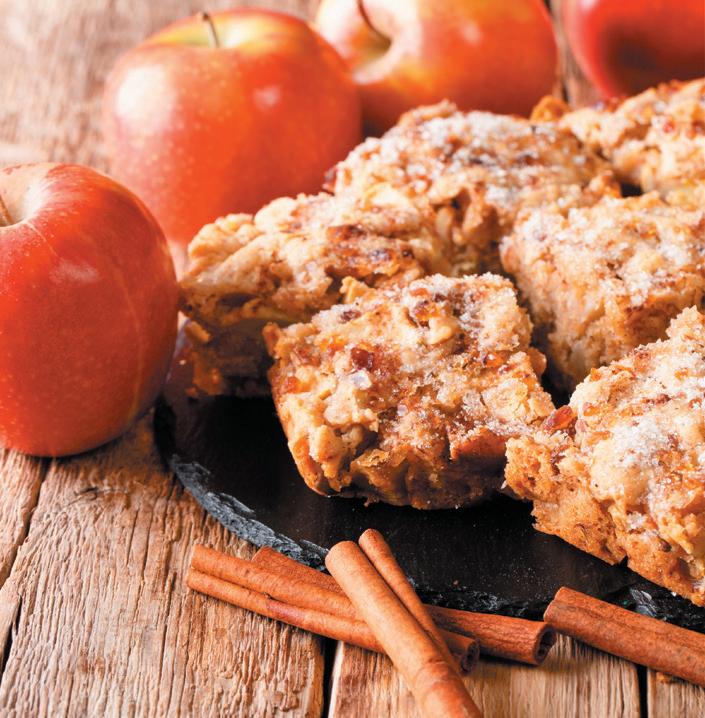
1 cup flour
1 teaspoon baking powder
¼ teaspoon salt
1 teaspoon cinnamon
1 cup diced apples
½ cup chopped pecans
Heat oven to 325°.
In a saucepan, melt butter and mix with sugars, egg and vanilla. In a separate bowl, mix flour, baking powder, salt and cinnamon together. Add to liquid, and beat until smooth. Stir in apples and pecans.
Grease an 8" square pan with cooking spray. Pour batter into pan, and bake for 35 to 40 minutes. Let cool, and cut into nine squares.
—Recipe adapted from Cooking Virginia Style with Farm Bureau Women
If you’re in a pinch and need a ride, ride-sharing services such as Lyft and Uber now are a standard choice for convenient, reliable transportation.
While most people utilize rideshare services to commute as riders, others frequently use ride-share platforms to earn an income as drivers. If this venture sounds right for you, it’s critical to ensure your vehicle, passengers and others are adequately covered in the event of an accident.
“When you purchase an auto policy for a vehicle that will be used for personal use, there’s an understanding between you and your insurance company that the insured vehicle will not be used for business,” said Barry
Light, senior manager of product development for Virginia Farm Bureau Mutual Insurance Co.
“The moment you make your vehicle available to pick up people or property using ride-share apps, you’ll want to make sure your policy is properly endorsed,” he continued. “Otherwise, if something should happen that damages your vehicle or harms your passengers or other road users, the coverages afforded by your ride-share company and unendorsed personal auto policy may very well fall short.”

To ensure broader coverage when working for ride-share companies, drivers must add a Transportation Network Company endorsement to their auto policies.
A TNC endorsement is designed to address certain gaps in liability, medical expenses, comprehensive and collision coverages between a driver’s personal auto policy and any insurance policies offered by ride-sharing companies to their drivers.
Coverages under the TNC endorsement vary based on the following ride-share stages: when the app is on; when a driver has been dispatched; and when people or property are being transported.
“Driving for a ride-share company can be a great way for people to make some money,” Light remarked. “But, if you cause an accident and your policy isn’t properly endorsed, that income can disappear quickly.”
Growing your business is important to you and it helps to have a trusted lender by your side. Contact us when you’re ready to take the next step in your operation.
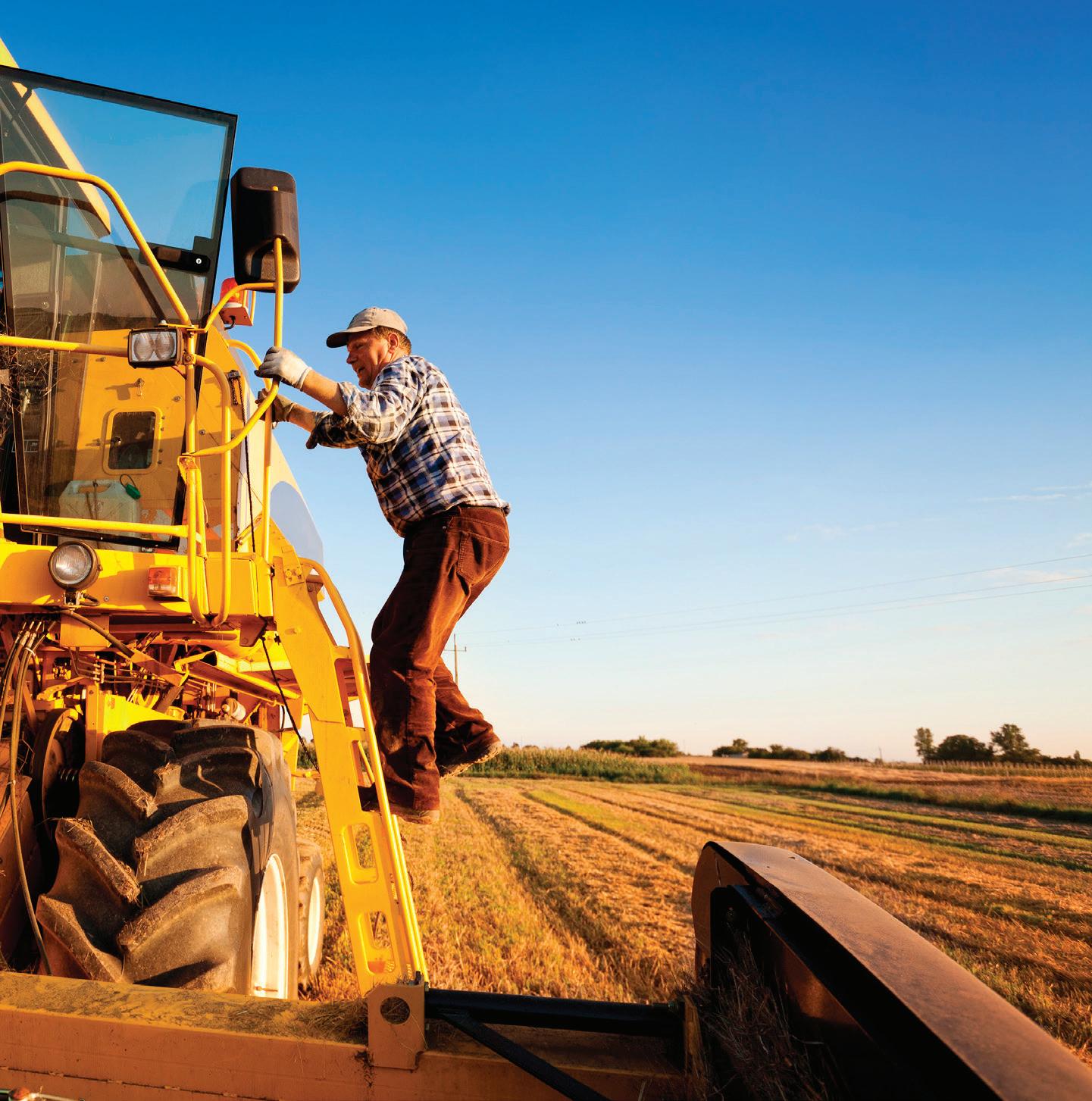
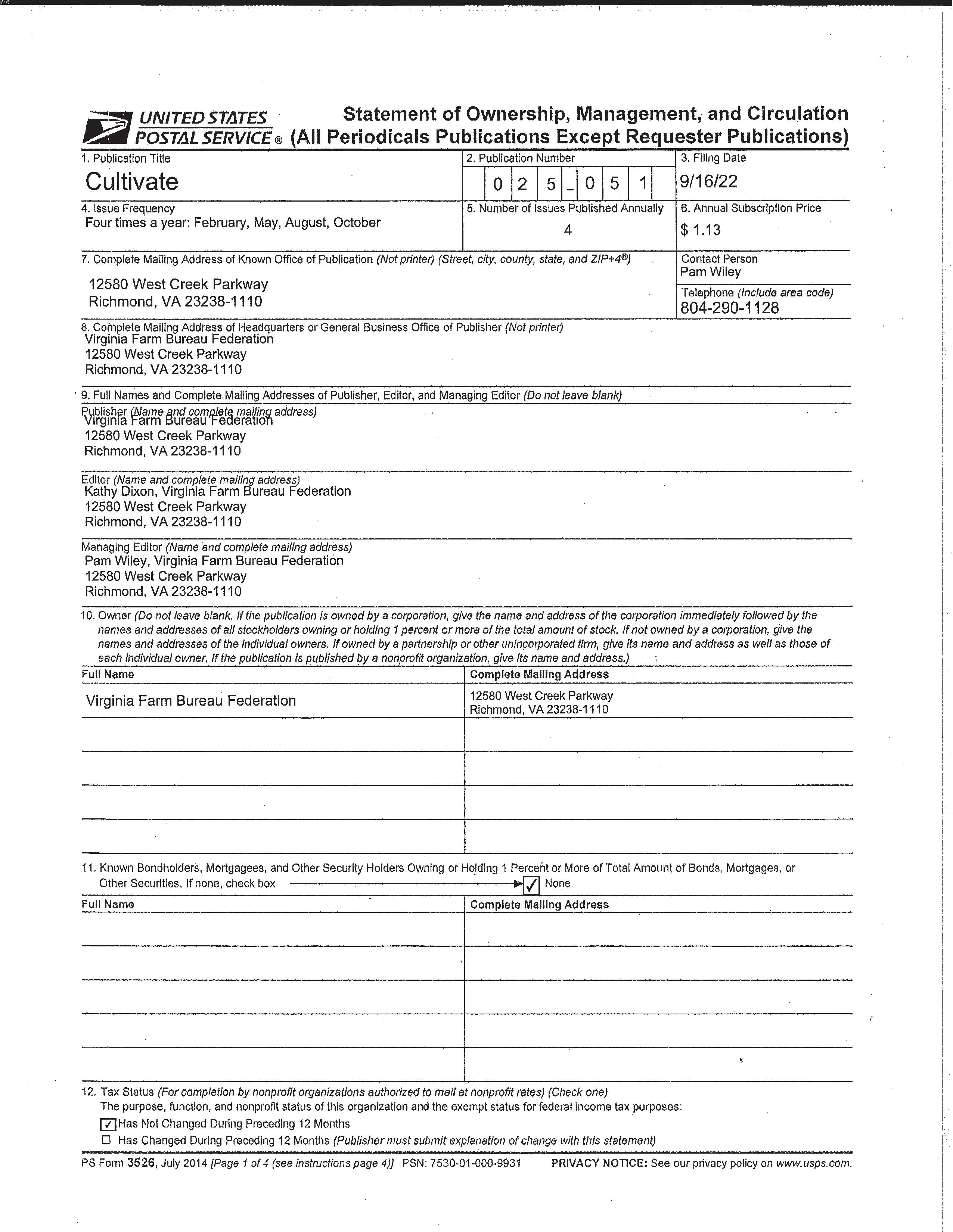
The annual meeting of Virginia Farm Bureau Mutual Insurance Company Policyholders will be held at 8:30 a.m., Thursday, December 1, 2022, at The Greenbrier Resort, 101 Main Street West, White Sulphur Springs, WV 24986 for the following purposes:
1. To receive and act upon the reports of the Company officers.
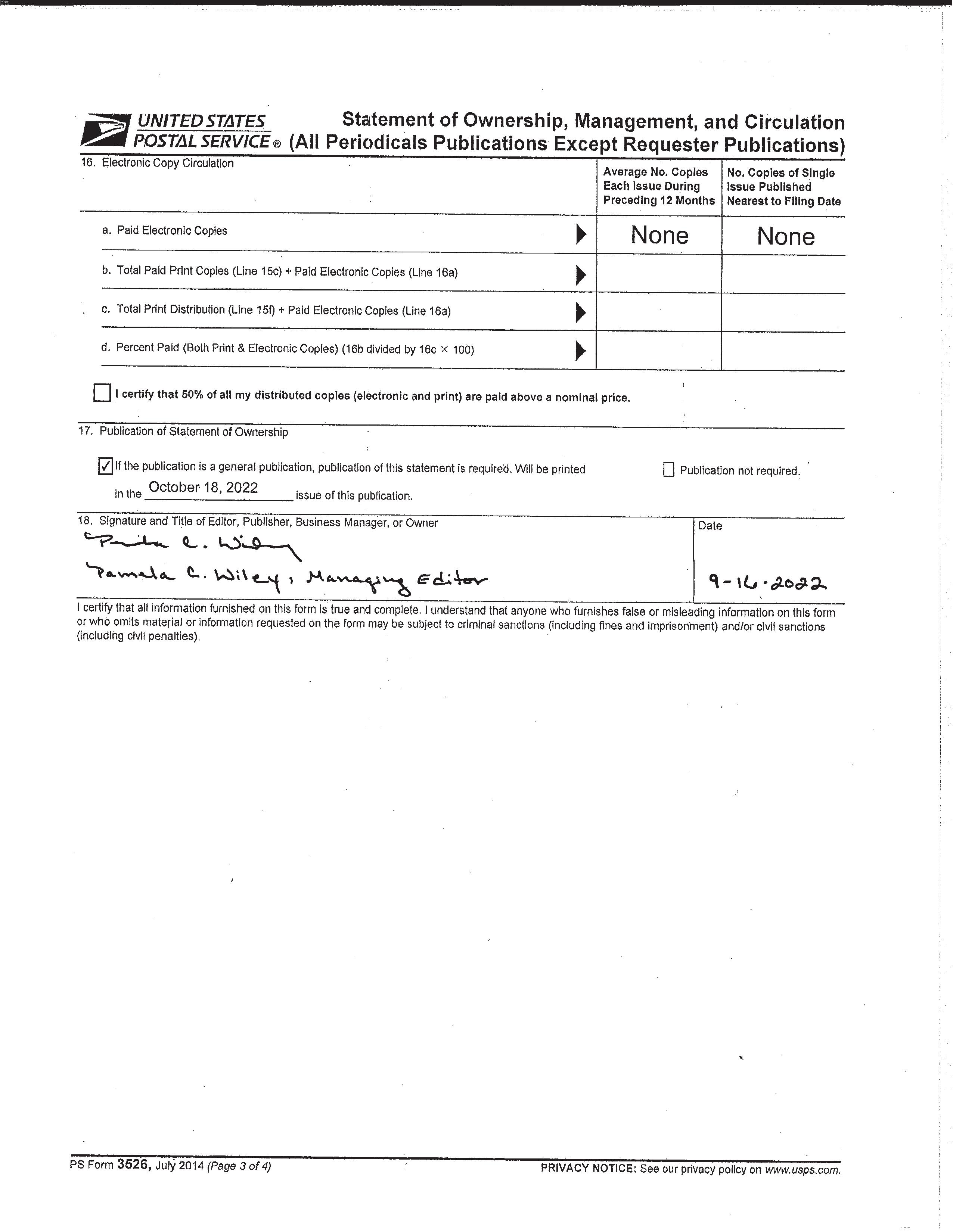
2. To elect a Board of Directors, each to serve a term of one year.
3. Other business as may properly come before the meeting or any adjournments thereof.
Dated this 1st day of October, 2022. Kathleen M. Early, Secretary

A weekly television program produced by Virginia Farm Bureau ®
Agriculture touches your life every day! Meet the Virginia farmers who raise products for your table and your community. Learn how to prepare delicious Virginia foods and cultivate a lush landscape and edible garden.
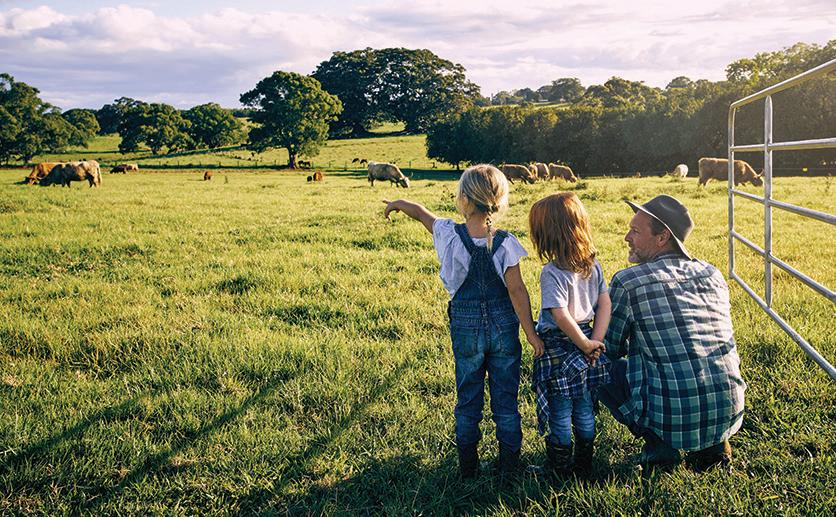
Real Virginia airs nationwide at 3:30 p.m. on the first Saturday of each month on RFD-TV on Dish Network and DirecTV, and on many cable outlets—check local listings.
Watch anytime at vafb.com, and weekly on
• WBRA digital channel 15.2
• WHRO Norfolk
• WTKR Norfolk
• WVVA Bluefield
Watch the first and second weekends of each month on • WRLH Richmond
• WVIR Charlottesville
• WHSV Harrisonburg